


























Welcome to the Aging in Community column’s special edition, part two.
The special edition of the Aging in Community column consists of a two-part series in the month of May that celebrates Older Americans Month. The first part, published in the May 4 edition of the San Francisco Bay Times, as well as part two in this issue are each discreet, pull-out sections of the paper.
The special edition continues the Aging in Community column’s almost decade-long tradition of featuring articles by a diverse group of contributors: LGBTQ elders, local and state officials, LGBTQ aging researchers, senior service providers,

LGBTQ aging and social justice advocates, and artists writing about the unique challenges and opportunities LGBTQ older adults face as we age.
The first part featured articles by Senator Scott Wiener, Dr. Meredith Greene, Daniel Redman, Brendalynn Goodall, Ames Simmons, Rudy Lemke, and Shireen McSpadden. The articles covered a wide range of subjects, from the history of protective legislation for LGBTQ elders in nursing homes and assisted living facilities, to the need for culturally competent services for aging HIV long-term survivors and the implementation of more targeted resources to prevent homelessness, and culturally competent services for unhoused LGBTQ older adults in San Francisco. Find these articles and more online in the first of the two sections: https://sfbaytimes.com/
The first article in this section is written by Dr. Kathleen Sullivan, Openhouse Executive Director. Dr. Sullivan describes how, in later life, we adapt to the vicissitudes of aging by employing strategies that optimize personal functioning and promote well-being. She identifies some of the unique challenges LGBTQ older adults face when interacting with mainstream social and medical services, with concerns about safety being most prominent. Fortunately, here in the Bay Area, LGBTQ older adults have a choice of accessing LGBTQ affirming senior services or services provided by LGBTQ community-based nonprofits.
The second article in this section is by Jewelle Gomez, a nationally acclaimed author and playwright. She writes about how she and a group of lifelong friends, all in their seventies, contrary to common assumptions about aging, continue

to be engaged in life, culture, politics, and the future. Whatever age you are, you will wish you could have joined them in their joyous and invigorating conversation.
In the third article, Grace Li, OnLok Executive Director, presents Club 75, the country’s first licensed adult day program designed with and for the LGBTQ community. The program was developed in partnership with Openhouse and is located in the Openhouse campus at 75 Laguna Street. Club 75 provides an array of benefits, such as wellness and personal care services, and social activities in a warm and friendly community environment. This groundbreaking program helps people continue to live and thrive at home and in community for as long as possible.


Next, Dr. Jason Flatt, Assistant Professor of Behavioral Health at the University of Nevada, Las Vegas, describes how he and his team are working to ensure LGBTQ inclusivity in Alzheimer’s and Parkinson’s disease research, treatment approaches, and care efforts. For far too long, LGBTQ people have been invisible in all these areas. Information is also provided on how you can become involved in these important efforts.
The fifth article is written by India Harville, founder of Embraced Body and a queer disability activist. Harvill shares her personal journey from ignoring her body and denying the challenges she was experiencing to valuing and loving her body and her authentic self. Now a strong advocate for disability justice, she uses her powerful voice to address inequities and change lives.
Honey Mahogany, one of the founders of the SF Transgender District, provides an evocative description of the district, as a sanctuary, a place of history, and a place where people can live and thrive in commu-
nity. It is a big vision but one that feels needed in a world where there is too little safety and protection for transgender people. The article is an invitation to the LGBTQ community to join her and her co-founders in actualizing this big, bold vision. The seventh article is authored by Eric Carlson, an attorney and Director of Long-Term Services and Support Advocacy at Justice Aging, a national nonprofit legal advocacy organization that fights senior poverty through law. He advises that, even though there are laws to protect LGBTQ people from discrimination in nursing homes and assisted living facilities, laws alone are not enough to protect people from discrimination. When possible, people need to self-advocate and be pro-active on their own behalf, to ensure they are treated with respect and receive the quality of care they deserve to receive.
Suzanne Ford, San Francisco Pride Executive Director, delivers the final article in our special edition of Aging in Community. She acknowledges the contributions of LGBTQ elders in our community in fighting for and securing our civil rights. She points out that now, more than ever, when our civil rights are dangerously under attack, the community needs their voices and experience to fight back. Her article is a call to action for LGBTQ people of all ages to come together at SF Pride to defeat those who would dismantle our civil rights and democracy itself.
The Aging in Community column now has an email address: agingincommunity@sfbaytimes.com
We invite you to comment on our column, let us know what aging
issues are on your mind, and what topics you would like to see in the future. We thank you for your support and your readership.
Dr. Marcy Adelman, a psychologist and LGBTQ+ longevity advocate and policy adviser, oversees the Aging in Community column. She serves on the California Commission on Aging, the Board of the Alzheimer’s Association of Northern California, the California Master Plan on Aging Equity Advisory Committee, and the San Francisco Dignity Fund Oversight and Advisory Committee. She is the Co-Founder of Openhouse, the only San Francisco nonprofit exclusively focused on the health and well-being of LGBTQ+ older adults.

Alegre Home Care is proud to support Dr. Marcy Adelman’s Aging in Community column in the San Francisco Bay Times







We are all aging, and some of us based on privilege, location, or family history will have a softer, easier experience than others. If you look at what the “experts” tell us, you will discover that, aside from a few relatively normal signs of aging, our individual aging is just that, individual.
So, what is normal and what is not?
Presbyopia, yes. Dementia, no. As a gerontologist, I bristle at the phrase “senior moment,” because it is not normal to lose your memory or focus as you age. While Alzheimer’s disease, a form of dementia, is a debilitating and life-changing disease for those with it and their caregivers, it is not normal.
Laura Carstensen of Stanford was one of the first to study how we adapt to our environment as we age. The work she did with Dr. Margret Baltes and Dr. Paul Baltes is summarized in a simple concept known as SOC, or selection, optimization, and compensation. As we age, we select which activities, for instance, we want to continue to pursue based upon our interest, ability, and access. We also optimize those things that we do well and the experiences of those things—for instance, taking an art class or attending a language class. Finally, there is compensation; for some of us, we will need to learn how to compensate for a frailty or change in our ability, such as using a cane or walker, or getting a book with large print from the library.
All of us are aging, and for the LGBTQ community there are additional things we consider and have to think about that our heterosexual counterparts do not. Feeling safe in a care setting is paramount, and, for older adults who interact with the medical or social service systems, feeling unsafe is a barrier to access and care. If one of our community members
does not feel they can be open and honest about their gender identity or sexual orientation, they are at a disadvantage.
It is common for older LGBTQ people to delay care or not disclose one’s gender identity or sexual orientation (or both) to a provider. A study by AARP found that two-thirds of LGBTQ seniors in long-term care settings do not disclose their gender identity or sexual orientation. That means isolating, changing the names and genders of lovers and friends, and no talking about past experiences—all to fit into the heteronormative assumption. Keeping a secret is stressful and can have a detrimental impact on both physical and mental health. Isolation and feelings of loneliness are correlated with earlier death.
While many in our community suffer in silence, in the Bay Area we have two wonderful resources that connect our elder community to one another and younger folks. The Oakland LGBT Center is home to Aging With Pride to support LGBTQ elders in the East Bay, and Openhouse provides programs and services to San Franciscans, and, increasingly, the greater Bay Area. In a study done of Openhouse programs, reductions in isolation and improvement of mental health outcomes were the result of providing safe space where LGBTQ
 By Dr. Kathleen Sullivan
By Dr. Kathleen Sullivan
older adults felt safe and connected to others in the community.

Barriers to service and programs are real for our community. Openhouse Training and Transformation for mainstream providers of care creates new and more safe spaces for LGBTQ elders to better serve our community. Together we are stronger and more able to support those who came before us who, through their blood, sweat, and tears, helped gain the privileges many of us have today.
Kathleen M. Sullivan, Ph.D. is the Executive Director of Openhouse, now in its 25th year of providing a suite of services for LGBTQ older adults in the Bay Area including mental health support, affordable housing, day services, educational and enrichment programs, and training for the professional aging services staff of California. She holds a Ph.D. in gerontology, has been called a tennis nut, is a proud ALC rider, and is wife to Rebecca, a great SFUSD teacher.


I grew up in Boston, a town that is proud to be old, at least in the context of the United States. It’s not old in relation to the rest of the world. In my recent visit to London, I thought about the meaning of the idea of “old.” It is impressive, at least to me, to stand on streets that were originally carved out by the Romans when London was called Londinium (47–50 CE). But if I ever get to visit Machu Picchu (built ca. 1450 CE), I may levitate with excitement!
No matter the place, item, or idea, I’ve always been entranced with the “oldest,” like original buildings and first-edition books. The origin of things is magical to me; maybe because I was raised by my maternal, great grandmother, who adopted me when she was in her 70s, and her daughter. They both lived into their late 80s and were active and energetic until they passed away.
One of the highlights of my trip to London this year was reuniting with some old friends I’d met when my novel was published in the U.K. by Sheba Press, a feminist, nonprofit. They are total originals: Val Wilmer, who is a legendary photographer of jazz and blues musicians from the U.S. and the U.K. as well as an author ( Mama Said There’d Be Days Like This), became a friend of mine and introduced me to other women who were making their own mark in the culture.

Margaret Busby, born in Ghana, was Britain’s first Black, female publisher (The Spook Who Sat by the Door). She later asked me to contribute to her anthology, Daughters of Africa. I also met Sue O’Sullivan, originally from the U.S. but a decades-long U.K. resident. She is a writer and publisher who was a member of the Sheba Collective as well as the Spare Rib magazine collective and author of sex positive texts. She included me in her radical feminist cookbook, Turning the Tables
None of the descriptions do justice to the enormity of their accomplishments at a time when women (like children) were still meant to be seen and not heard. The point, though, is that, by looking at what mountains have been cut down to size by those who trod the path before us, we can take heart as we try to make inroads into the thicket of patriarchy. I’ve run out of metaphors here!
The four of us and my spouse, Diane, spent a rowdy, jolly, plaintive, and celebratory afternoon together eating the extravagant lunch Sue made for our reunion! Of course, we had our heated anger about how women still needed to claw our way through to make any personal or professional progress. It seemed there is no end to the number of times the battle must be fought for women’s rights to our own bodies and minds.
Yet several things about these “old” friends felt extraordinary. At 74 I happened to be the baby of the group, but not by much. And I noticed the first thing we had in common was that, unlike the popular expectation, none of us had grown conservative as we aged. Whether decrying Brexit’s anti-immigrant tones or continued belief in the importance of hearing women’s voices, we had not retreated to the safe, middle-of-the-road space.
Three of us lesbians, one not, were each immersed in the cultural life we’d had in our younger years. What
a relief it was to have a discussion of music, books, and films that was as lively for us in 2023 as it had been more than 40 years before. Our energy remained unsuppressed by time or physical changes.
When we parted, it was palpable that we each were looking forward, not just behind us. Our memories and how we framed the past for others was significant for us. Maybe our experiences had made us wise but not smug. Our greater energy was still
focused on what we might do next: to fulfill our own dreams and to aid the promise of the next generation.
Jewelle Gomez is a lesbian/feminist activist, novelist, poet, and playwright. She’s written for “The Advocate,” “Ms. Magazine,” “Black Scholar,” “The San Francisco Chronicle,” “The New York Times,” and “The Village Voice.” Follow her on Instagram and Twitter @ VampyreVamp


When Openhouse and On Lok began working together on the concept of an adult day program for the LGBTQ+ community, in 2018, our goal and hope was to help LGBTQ+ seniors who were aging in isolation access services and supports in order to remain living in their community.

We all share the goal of aging in the place we call home, surrounded by the people we love, in a community where we feel a sense of belonging. Aging in place is especially important for LGBTQ+ seniors, who are more likely to be at risk for nursing home placement due to lack of family support, health disparities, and other risk factors, and to face discrimination and mistreatment in long-term care facilities.
The fear of ending up in an institution, away from their chosen family and community, is common among LGBTQ+ older adults who have experienced the trauma of discrimination and exclusion in their lifetime. According to a 2011 study by the National Senior Citizens Law Center, 78 percent of LGBTQ+ people surveyed felt it would be unsafe for an LGBTQ+ senior to be “out” in a care facility, and 80 percent believed staff and other residents would discriminate against an
LGBTQ+ elder who was out of the closet.
Openhouse and On Lok had the expertise and deep desire to deliver services to help these seniors age in place. On Lok has over five decades of experience pioneering programs to maintain seniors living in their homes for as long as possible. Openhouse has a history of providing housing, services, and community programs to LGBTQ+ seniors. However, as we engaged with the community to learn more about their unique needs, we realized that accessing aging services, even in LBGTQ+-friendly San Francisco, was of itself a challenge for this population. In the groundbreaking Needs Assessment of LGBTQ+ Senior Health in San Francisco—published by University of Nevada, Las Vegas, Assistant Professor of Public Health Dr. Jason Flatt when he was an Associate Professor at the UCSF Institute for Health and Aging, and released by Openhouse and On Lok—data showed that LGBTQ+ seniors are four times less likely to access aging services than other populations. One in five respondents felt unsafe or unwelcome in care settings; others reported difficulty accessing
transportation to services and programs that did not reflect the LGBTQ+ experience.
To overcome the deep mistrust of LGBQ+ seniors, we knew we had to create a space and a program that really spoke to the needs and concerns of the LGBTQ+ senior community in all of its glorious diversity. In partnership with Openhouse, we envisioned a safe and inclusive space where community members could connect with their peers, enjoy activities that recognized and celebrated their identity, eat a nutritious hot meal together, and receive affordable and compassionate care to support their health and wellness.
Since it launched in December 2021, Openhouse + On Lok Community Day Services has been using the strength, expertise, and credibility of our organizations to bring to the community a program you don’t see anywhere else in the nation. Openhouse + On Lok Community Day Services is the first licensed day program in the nation co-designed with and for the LGBTQ+ community. And it is a true partnership between Openhouse and On Lok.
Located on the second floor of a brand-new facility built by Openhouse at 75 Laguna Street in San Francisco, the day center houses
a large and light-filled activity room with state-of-the-art equipment, a kitchen, library, and gender-neutral bathrooms with showers. It shares an outdoor courtyard with the residents of the Openhouse community at 55 Laguna, with picnic tables and natural shade. In this welcoming and lifeaffirming space, LGBTQ+ seniors can engage with their community and benefit from meals, wellness and personal care services, transportation, and social activities. The program is offered with a sliding scale discount to make it affordable to all.
Seniors who were once averse to engage with clinical settings because of historical trauma now enjoy support services and social connections at Openhouse + On Lok Community Day Services. When the community began to affectionately call it Club 75, we knew that our participants care about their center, and feel as if they belong there. Community members are always sharing with us the positive impact of Club 75 on their lives. Our most recent success stories go straight to the heart of our mission and our vision for this program. We were able to help Sharon with social activities and care for her wife, Barbara, whose memory is starting to decline, so she can remain living at home and socially connected with her chosen community. Other programs they tried were either unresponsive, too expensive, or just did not feel right. But at Club 75, Barbara has found critical care sup -
port and community, in a safe environment she trusts. Sharon has started attending an Openhouse support group for caregivers, which has become an important outlet from the stress and grief of caregiving.
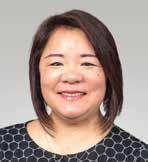
Another participant, Maryanne, is grateful for the opportunity to break out of years of isolation and enjoy lunch, walks, board games, and conversations with her queer peers. Because of a disability, she used to feel that her world was shrinking, and she was becoming invisible. Most of her friends have moved or were lost during the AIDS epidemic and COVID-19. But today she feels seen and embraced by her community at Club 75.
And after two years of sheltering in place, Miss Patti Ann, a transgender woman living with disability, is thrilled to spend her days at Club 75. Like many transgender seniors, she had no one to rely on for support and social interaction. Here she has found a fun group of people who care about her, and life-affirming activities she can enjoy as her authentic self. She appreciates cooking classes and an exercise program she can do while seated in her chair. With safe transportation now available, she has come out of her shell and is discovering the city with her new friends.
A Program Informed by the LGBTQ+ Experience
(continued on page 10)

I’m proud of all my social identity markers—Black, queer, woman, and disabled. Out of all of my identities, developing disability pride was the most challenging. I didn’t always identify as disabled, although I have had chronic health challenges my entire life. As a Black queer woman whose ancestors survived by hiding parts of themselves deemed deviant, dangerous, and unlovable by a white ableist cis-heteropatriarchy, I wasn’t eager to publicly claim another marginalized identity. Queer had already come at a cost, and I had every reason to suspect that claiming disabled would be even more costly.
Disability had already claimed me, however, and as the end of my twenties arrived, my ability to ignore my body, mask my neurodivergence, and suppress my mental health challenges withered away. My disabilities, which I had been able to conceal in my younger years, became quite apparent. I was no longer only grappling with my own internalized ableism; I was experiencing interpersonal and structural ableism daily as I tried to adapt to using a wheelchair because of hemiplegic migraine, being too tired to feign neurotypical behavior, and having a myriad of access needs. I needed to learn new strategies to navigate my life and the world.
Fortunately, I was living in the Bay Area at the time, and I was beginning to learn about Disability Justice. Two events stand out vividly for me as turning points in how I started to shift my ideas about disability, and, ultimately, myself. The first was the 2009 Sins Invalid Annual Performance. I remember being in the audience and seeing the performers talk about experiences with their bodies that mirrored my own without shame but instead with love. Leah Lakshmi Piepzna-Samarasinha’s poetry made me feel like they had found a copy of my diary. It was compelling and moving, but I was still unsure if that could ever be my reality. After all, I wasn’t in the habit of sharing my diary with the world. The second event occurred in 2011. I heard Mia Mingus speak at the Femmes of Color Symposium. In her keynote address, entitled Moving Beyond the Ugly: A Politic Beyond Desirability, Mia shared a quote from June Jordan that still resonates with me: “To tell the truth is to become beautiful, to begin to love yourself, value yourself. And that’s political, in its most profound way.”
Mia invited me into the possibility that claiming my disabilities publicly and politically could be powerful, that undoing internalized ableism would support me to dismantle it in society, and that telling the truth about my body/mind, not just in my diary but to others, could change my life and the world for the better.
I have no idea why Mia’s words impacted me so deeply that day, but from that point forward, I became a lifelong student of Disability Justice. Disability Justice is a movement that addresses how multiply-marginalized disabled people are impacted at the intersections of ableism and other types of oppression (racism, cisheterosexism, classism, etc.). Ableism— as defined by Stacey Park Milbern,
By India Harvilleone of the founders of the Disability Justice movement who became an ancestor three years ago—is a system of oppression that favors being nondisabled at any cost, frequently at the expense of disabled people. Disability Justice centers the needs and concerns of disabled QTBIPOC and recognizes that those of us living at multiple intersections of oppression should lead the way in building alternatives to the oppressive systems that harm all of us.
Disproportionately, the brunt of the impact of oppression lands on multiply-marginalized communities, including disabled QTBIPOC (Queer, Trans, Black, Indigenous People of Color) communities. There is too little research that explores people living at these specific intersections, which compound the impact of each of the individual identity markers. But what we do know is that disabled QTBIPOC experience extreme health disparities, which have been especially highlighted during the ongoing COVID-19 pandemic. Being a disabled QTBIPOC negatively influences life expectancy by multiple years. Disability is an often under-acknowledged component of police violence experienced by BIPOC. There is a lack of acknowledgment of the ongoing health risks of COVID-19 for disabled QTBIPOC, in particular.


Disability Justice activists and communities continue to work to address these inequities. We create disabledfriendly mutual aid networks; we advocate on behalf of each other in medical settings; and we continue to encourage people to learn more about Disability Justice and deepen their analysis of intersectional ableism. Loving other disabled QTBIPOC in these ways has helped me learn to love myself more. We’ve accomplished so much, and yet, there is still so much more to do.
Although I am only in my forties, now my focus is turning to Disability Justice and aging. I’ve lost so many disabled QTBIPOC community members at a young age due to oppression, and in many subsets of my community, making it to forty is noteworthy. You are even considered an elder. I want to help ensure that disabled QTBIPOC are not only making it to be 50, 60, 70, and older but also that we are thriving.

Ageism and ableism have many commonalities. People often treat older adults and disabled people as disposable and invisible. Both communities are negatively stereotyped as not having anything to contribute, being perceived as incapable, and being framed as a burden. Disabled communities and older adults are both negatively impacted by how diffi-
cult it is to find caregivers due to the current shortage of trained providers. Both communities have concerns about autonomy and having access to remaining safely in their own homes instead of institutions and nursing homes. Some disabled community members and older adults share ongoing concerns about keeping the most vulnerable populations safe during the COVID-19 pandemic as many communities resume pre-pandemic practices. These concerns are even more pronounced for multiply marginalized disabled people who are now also experiencing ageism.
In 2011 I did not realize that claiming disability would actually be liberatory and one of my primary paths to learning to love all my marginalized identities: Blackness, queerness, and disability. I have a lot of gratitude for the people who politicized me into Disability Justice and helped me fall in love with embracing all of myself. I will be forever grateful to Patty Berne, Leroy Moore, Stacey Park Milbern, Leah Lakshmi PiepznaSamarasinha, and Mia Mingus.
I am moving towards embracing a new marginalized identity, but I am also holding it differently because of all the work I have already done to love the other parts of myself. So, as I work to embrace “elder,” I won’t keep my writing secret in my diary. This time, I want to share my truth sooner about loving and valuing myself and my communities as we age. I hold the desire to be a thriving disabled QTBIPOC elder, and I will continue to work to create a world where that is possible for all of us.

India Harville (she/her), Founder of Embraced Body, is an African American, disabled, and queer disability justice activist. Harville’s work centers reclaiming the body as an often-underestimated pathway to decolonizing ourselves to foster social justice, equity, and inclusion. To learn more about her work, please visit www.embracedbody.com
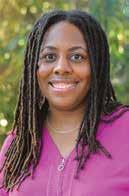
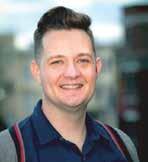
It’s almost Pride month and we cannot celebrate our diverse communities without acknowledging the LGBTQIA+ pioneers—Marsha P. Johnston, Silvia Rivera, Felicia “Flames” Elizondo, Donna Personna, Del Martin and Phyllis Lyon, Cleve Jones, and Harvey Milk—who fought for our LGBTQIA+ equality and rights. We have made progress despite the social and political attacks on our rights, and yet, we have to continue to fight to reshape systems and ensure our pioneers have access to the cornerstones of successful aging. These cornerstones include legal protections and economic security, social connections and support, and access to welcoming and quality healthcare. We estimate that there are over a million LGBTQIA+ adults in the U.S. who are aged 65 and older— nearly 17,000 LGBTQIA+ adults aged 65+ live in San Francisco. Age is one of the leading risk factors for Alzheimer’s and Parkinson’s disease. We know that many LGBTQIA+ adults aged 65+ are more likely to experience health challenges that increase their risk for these neurological diseases. These health challenges include hypertension, sleep problems, diabetes, stroke, head trauma, depression, and PTSD. Many of these health challenges are likely due to, or intensified by, the historical and current discrimination experienced by LGBTQIA+ people in our society and because we lack human rights protections, such as equal access to housing, employment, and welcoming healthcare.
Recent policy and advocacy efforts by the Alzheimer’s Association, the Michael J. Fox Foundation for Parkinson’s Research, and additional groups have led to efforts to increase funding for research and care resources. For instance, signed in 2011, the National Plan to Address Alzheimer’s Disease Act (Public Law 111-375) aims to prevent and effectively treat Alzheimer’s disease by 2025. The plan provides funding to enhance quality and efficiency of healthcare, expand support for those living with Alzheimer’s disease and their families, increase public awareness, improve data tracking, and promote healthy aging and reduce risk factors. To date, the National Institutes of Health has provided over $3 billion for Alzheimer’s disease research. There is also a proposed bill currently being discussed by congress (H.R.2365/ S.1064) for the National Plan to End Parkinson’s.
We still have limited knowledge of how our community is impacted by Alzheimer’s and Parkinson’s disease. Ours and other’s research has found that between 7 to 20% of LGBTQIA+ adults aged 65 and older have a diagnosis of Alzheimer’s disease or a related dementia.
Ames Simmons’ article in the prior issue of the San Francisco Bay Times, “Transgender People and Dementia Care,” highlights how concerns around memory and Alzheimer’s disease are elevated for the transgender community. We do find major concerns for the transgender community. For instance, a recent study looking at fee-for-service data from 2008–2017 for Medicare beneficiaries
aged 65+ found that rates of Alzheimer’s disease and dementia were nearly double for transgender men and women (21%) compared to around 12% for cisgender (not transgender) men and women.
We also know that LGBTQIA+ community members are more likely to report subjective cognitive decline or concerns with worsening or impaired memory and thinking than their non-LGBTQIA+ peers. Also, these memory concerns were higher for transgender adults and those with additional marginalized identities (i.e., bisexual adults and LGBTQIA+ communities of color). We additionally found that over 50% LGBTQIA+ adults with these memory concerns do not talk to their healthcare providers about them. Another recent study with LGBTQIA+ persons living with Parkinson’s disease found that LGBTQIA+ people and women were more likely to report discrimination in healthcare. We also know the needs of LGBTQIA+ caregivers/care partners of persons with memory loss, and Alzheimer’s and Parkinson’s disease, are often overlooked.
While there have been national efforts to address Alzheimer’s and Parkinson’s disease research, care, and supports, the LGBTQIA+ community has not been included in the research, treatment approaches, and related care efforts. Researchers have been working to ensure LGBTQIA+ people are represented in national research. For instance, our team was able to get questions added to the National Alzheimer’s Coordinating Center, which works with 42 Alzheimer’s Disease Research Centers across the U.S. As part of the coordinating center’s efforts to improve data collection, we have been able to include questions about sex assigned at birth, gender identity, sexual orientation, and intersex traits.
Our Rainbows of Aging teams at the University of Nevada, Las Vegas, and University of California San Francisco are also working to ensure our community is represented in research. For instance, we are partnering on the first federallyfunded research registry (Research Inclusion Supports Equity or RISE) for LGBTQIA+ community members experiencing memory loss or those caring for someone with memory loss. The registry aims to learn about the types of research community members want and identify ways to ensure the LGBTQIA+ community is included in other Alzheimer’s disease research. The Rise Registry brings together LGBTQIA+ community leaders, researchers and nonprofit organizations, such as The Alzheimer’s Association, CenterLink, and LGBTQIA+ senior service organizations, to guide the research and identify welcoming care and support services across the U.S. You can learn more and sign up for The Rise Registry by visiting https://www.theriseregistry.org
We have another new study funded by the Alzheimer’s Association. The Stonewall Generations Study is a research study for both LGBTQIA+ and non-LGBTQIA+ adults who are
50 years or older. We want to learn more about our communities’ concerns with memory, thinking, and health. We are inviting community members to complete a 45-minute telephone interview and receive a $25 Visa gift card. If you are interested in participating, leave us a message at 1-833-966-6974.
We also have a new three-year study funded by the Michael J. Fox Foundation for Parkinson’s Disease Research. PRIDE (Parkinson’s Research with Inclusion, Diversity, and Equity) is learning about the health and healthcare needs of our communities living with Parkinson’s disease and their caregivers/care partners. If you are interested in participating, leave us a message (at 1-888-709-7689). Those who complete the interview will receive a $25 Visa gift card.


Finally, we want to encourage you to consider some of the amazing efforts in San Francisco. For instance, there are programs such as the San Francisco LGBTQ+ Dementia Care Project, a partnership between the Alzheimer’s Association, Openhouse, and Family Caregiver Alliance, and funded by the San Francisco Department of Disability & Aging Services. LGBTQ+ Dementia Care Project is a free training to health and social service providers on the care needs of LGBTQ+ seniors living with Alzheimer’s disease or other dementias and their care partners in San Francisco City and County. You can request the training at https://tinyurl.com/27przz86
Finally, Openhouse and On Lok have created a new program, Community Day Services, which is called Club 75 by participants. On Lok also has an article in this issue about Club 75, a new adult day program for LGBTQIA+ community members and their families that provides a safe and affirming space for LGBTQIA+ seniors who might need additional support with Alzheimer’s or aging-related care and want to engage with their community and benefit from meals, services to support wellness, and personal care, transportation, and social activities. The program cost is based on a sliding scale to make it affordable to all.
By Jason D. Flatt, Ph.D., M.P.H.To learn more, call 415-535-0927 or email Ephraim Getahun at egetahun@openhousesf.org

Jason D. Flatt, Ph.D., M.P.H. (Pronouns: He/They) is an Assistant Professor at the University of Nevada, Las Vegas, School of Public Health, Department of Social and Behavioral Health and Adjunct Associate Professor with the University of California, San Francisco, School of Nursing, Institute for Health and Aging. Dr. Flatt’s current research works to better understand concerns and needs of diverse lesbian, gay, bisexual, transgender, queer, intersex, asexual, and additional identities
adults living with Alzheimer’s disease, Parkinson’s disease, and their care providers. In 2020, he received the Early-Stage Investigator Award from the NIH Sexual and Gender Minority Research Office. His research is funded by the National Institute on Aging, American Federation for Aging Research, The Alzheimer’s Association, and The Michael J. Fox Foundation for Parkinson’s Research. He and his husband live in Las Vegas with their three pups: Tuna, Bowie, and Elton. You can learn more about his research and team members at www.RainbowsofAging.org

Imagine a place where trans people thrive. Imagine a place where we have a home and a community, where we can afford housing, start a business, start a family, and have access to amenities that serve us. Imagine a place where we are surrounded by affirmation—from the people in the street, the art on the buildings, the plaques on the sidewalks, the flags on the light poles. Imagine a place where we can thrive.
When Janetta Johnson, Aria Sai’d, Stephany Ashley, Nate Allbee, Brian Basinger, and I came together to establish the Transgender District, that is what we imagined. A sanctuary for trans people; a safe space in a city known for being a gay mecca, but where we saw trans people and our city’s trans history falling through the cracks. We built on the work of Dr. Susan Stryker—who rediscovered the 1966 Compton’s Cafeteria Riots, widely proclaimed as the first officially documented LGBTQ uprising in the country— and founded the district centering the location where this pivotal event in our city’s history took place. At the time, San Francisco, like many other cities across the country, was experiencing a crisis. We were losing many of our LGBTQ serving businesses and spaces, and many



members of our community were being completely pushed out of the city. Even the Tenderloin, a neighborhood that has been a sanctuary for trans and gender non-conforming people for decades, was becoming unaffordable. Many of our trans community members, especially our seniors, were barely surviving on social security checks and struggled to pay rent for their SRO apartments even with rental subsidies. While the impetus to create the district was to stem the tide of displacement, we knew that, in order to truly serve our community and make a lasting impact, our vision had to be far broader. We envisioned a place where trans people could thrive.
Over the last six years the Trans District has done much to make that vision a reality. Place making efforts include murals within the district, art panels on Big Belly trash cans, and a public awareness campaign titled “Know Our Place.” A visual storytelling project chronicled the experiences of trans people living in San Francisco. An Entrepreneurship Accelerator for Trans and Queer people included a four-month bootcamp program and a seed grant for program graduates. In its early days, the Transgender District also had
a rental subsidy program, and during COVID-19, the district was one of the first organizations to provide direct financial assistance to those in need. Sadly, while we have been busy trying to make San Francisco a more welcoming and celebratory place for

(continued on page 10)

For most people, moving into a nursing facility or assisted living facility is a transition into the unknown. And not necessarily a benign unknown, but “unknown” with a whiff of foreboding. This is doubly true for LGBTQ+ older adults, who well may be wary about moving into an unwelcoming or even hostile environment.
How to address this problem? One strategy is to pass a law. Since 2018, California has had a Bill of Rights for LTBTQ+ residents of long-term care facilities. The law prohibits facilities from discriminating on the basis of sexual orientation or gender identity in certain specified actions. The nodiscrimination principle explicitly applies (for example) to admission and eviction decisions, room assignments, and clothing choice.
One provision of the Bill of Rights—the socalled “pronoun provision”—is currently being challenged in state court. Under this provision, if facility staff have been “clearly informed” of the resident’s chosen name and pro -
nouns, they commit a violation by “willfully and repeatedly” failing to use the name or pronouns.
As things currently stand, this provision is unenforceable, based on a ruling from a state appellate court that the provision violates facility employees’ free speech rights.
According to the court, the law regulates the content of speech and, although the law’s goal may be admirable, the state has adopted an unduly restrictive method to reach that goal. The court relied heavily on a finding that, under some circumstances, a staff member hypothetically could be guilty of a criminal offense by using the wrong name or pronoun.
Importantly, this appellate court ruling will not be the last word: the California Supreme Court accepted the case for review and is expected to issue its opinion later this year.
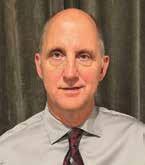
Justice in Aging submitted a friendof-the-court brief defending the law on behalf of itself, Openhouse (a nonprofit San Francisco LGBTQ+

senior service organization), and several other California community organizations.

The Importance and Power of Individual Advocacy
But passing laws (and sometimes the related litigation) are only part of the answer.
LGBTQ+ facility residents can recognize the importance of legislation while also understanding the need to look out for yourself, sometimes, but not always, by utilizing the relevant law.
Perhaps the most obvious individual action is choosing a welcoming facility. A small number of California facilities designate themselves specifically for LGBTQ+ residents while others— due to history, a management initiative, or other factors—put themselves out as open and affirming for an LGBTQ+ clientele.
https://www.c-span.org/video/?472971-1/coronavirus-subcommittee-hearing-covid-19-nursing-homes


on your own behalf as possible (or have a friend or family member be proactive on your behalf).
How to identify a facility that welcomes LGBTQ+ residents? A stereotypical indication would be a rainbow flag or marketing materials that feature same-sex couples. But a potential resident does not have to rely on discreet clues, nor overlook the power of asking questions.
I encourage you to be as proactive
Ask the facility about LGBTQ+ residents. Ask about no-discrimination policies. And ask about things that are specifically important to you, whether related to sexual orientation, gender identity, health care needs, favorite activities, or any other concern.
Remember, a potential resident represents possibly tens of thousands of dollars of future income for the facil-
ity, and should be prepared to exercise the leverage that comes with controlling that much money. And if facility staff seem uncomfortable with your inquiries or with the concept of an LGBTQ+ clientele? Better to know now rather than later.
(continued on page 10)
LI (continued from pg 5)
Club 75 staff bring their own first-hand experience of discrimination and marginalization to break down barriers and ensure the program is applicable, relevant, and impactful in meeting the needs of LGBTQ+ seniors. Staff members identify with the queer community they serve and revere their elders. They are specially trained to care for adults who have experienced trauma or have mental health challenges, or who are living with Alzheimer’s or other dementias.
Our programming is robust and intentional, filling the day with activities tailored to the individual needs of participants. Seniors are engaged in San Francisco’s culture, with outings to music performances, cultural events, gallery, and museums—the kind of activities they enjoyed when they were younger and now cannot access on their own.
If needed, members and their caregivers are referred to additional health and social services through Openhouse and On Lok to provide them with a continuum of care as their needs change. The center is now a certified alternative care setting (ACS) for the Program of AllInclusive Care for the Elderly (PACE), the full-service healthcare program pioneered by On Lok to empower seniors with long-term care needs to live at home for as long as possible. Alternative care settings offer PACE participants more geographically convenient access to some of the services they receive, such as preventative care and meals. On Lok has a history of supporting vulnerable populations by creating alternative care settings with partners in the community. For the city’s LGBTQ+ seniors who choose to enroll in On Lok PACE, it will also include the choice to attend Club 75.
Ephraim Getahun, Director of Strategic Partnerships & Training at Openhouse, is leading outreach deep in the community to identify seniors who would most benefit from the program. Hospitals and skilled nursing facilities are learning about us and reaching out when they discharge people as they are transitioning back to the home. Many want to embed Openhouse + On Lok Community Day Services in their care planning.
Our dream is for the program to grow and lift the lives of all LGBTQ+ seniors in need, and for our partnership with Openhouse to continue to flourish. We are deeply grateful to all the people who have worked so hard to make our bold vision of creating a safe and inclusive space for LGBTQ+ elders a reality: Karyn Skultety and Marcy Adelman, with whom we began our amazing journey, and Openhouse Executive Director Kathleen Sullivan for her leadership and guidance going forward. Together, we can ensure that LGBTQ+ seniors have the services to age as their authentic selves in the community they love.
For additional information about Club 75, contact Openhouse + On Lok Community Day Services at 415-2928302 or email communitydayservices@ onlok.org
With more than three decades in healthcare and 22 years at On Lok, Grace Li’s experience spans a wide range of healthcare settings. She has worked in hospitals and managed physician practices, in private and academic settings, and in assisted living facilities and healthcare consulting. She holds a Master of Health Administration from the University of North Carolina, Chapel Hill, and a Bachelor of Arts in Economics from the University of Florida.
trans people, much of the rest of the country is moving in the opposite direction. We have seen over 400 bills proposed across this country that threaten the safety of LGBTQ people. This includes everything from book bans, to drag bans, to banning trans children from playing sports, banning trans teens from receiving gender affirming care, and taking trans children away from their parents.
What is happening in states like Florida is absolutely terrifying, and we need all hands on deck to fight back. We must continue to support organizations like the Trans Law Center, the National Center for Lesbian Rights, and the American Civil Liberties Union that are on the frontlines of many legal battles to push back against these laws. And as more and more trans people, trans parents, and parents with trans children leave places like Florida to come to places like San Francisco, it is even more important to make sure that we make them welcome.
With organizations like El/La Para Trans Latinas, Lyon-Martin, St. James Infirmary, San Francisco Community Health Clinic, San Francisco AIDS Foundation, TGIJP, the SF LGBT Center, LYRIC, and, of course, the Transgender District here in San Francisco, we can continue to be a sanctuary city for the transgender community, but only with support from the city, the state, and, most importantly, the community. We have to turn our thoughts, our hopes, and our vision into action so all of us can be safe, be our best authentic selves, and thrive. Honey Mahogany is an activist, social worker, and performer who grew up in San Francisco and got her Master in Social Work from UC Berkeley. She is a founder of the Transgender District, a Co-Owner of the Stud Bar, a founding queen of Drag Story Hour, and Chair of the San Francisco Democratic Party.
Continuing to advocate for yourself after admission is also important. Both nursing facilities and assisted living facilities are required by law to work with residents (or a resident’s representative—this can be a family member or friend) to develop a service plan. Federal nursing facility law explicitly requires that care be “person-centered,” and that a facility make reasonable accommodations for a resident’s needs and preferences.

An important step in self-advocacy is bringing in other people to help. The resident or representative can consult with the publicly-funded Long-Term Care Ombudsman Program, which provides advocacy assistance for residents of nursing facilities and (to a lesser extent) assisted living facilities. Also, a resident has the option of filing a complaint with the relevant state inspection agency. In any case, the first and essential step for self-advocacy is the resident saying, “No, this is not good enough.”
There was a time when no laws supported the rights of LGBTQ+ people. Now, the laws have improved to a significant extent, but remaining gaps in relevant law, along with rampant facility noncompliance, still often leave facility residents in a precarious position. As a practical matter, residents and their representatives must assert their rights when the facility falls short. Speaking up may feel intimidating, but staying silent and hoping for the best is not a winning strategy. Reach out to others so you are not alone—to a friend, relative, neighbor, legal aid office, community social worker, ombudsman representative, or others. Don’t give a longterm care facility more power than it actually has. Facility staff feel pressure too, and the ombudsman program and licensing agencies can provide helpful back-up. The resident who stands up for themself, with help from a few friends or allies, may be pleasantly surprised by how much can be accomplished.
Eric Carlson, an attorney, is Director of LongTerm Services and Supports Advocacy at Justice in Aging, and is the author of the comprehensive consumer guide “25 Common Nursing Home Problems and How to Resolve Them,” available for free at https://justiceinaging.org/
This year, the theme for SF Pride is “Looking Back and Moving Forward,” which is entirely appropriate for 2023. As we continue to make strides towards equality and acceptance, even in the face of an onslaught of Republican legislation aimed at restricting our rights, it is more important than ever to honor the trailblazers who fought and won the battles before us. Our elders stood up and came out in a time when simply being LGBTQ+ was not only taboo but also illegal. They courageously fought for our rights, when we had none, and continue to support and fight for our community today.
When I think of our elder advocates, I think of Janie Spahr, one of my beloved mentors who helped to shape my advocacy. Beginning in 1979, she was instrumental in fighting for the inclusion of LGBTQ people in the Presbyterian Church. She founded the Spahr Center, the only LGBTQ+ nonprofit in Marin. Her commitment to the LGBTQ+ community is unwavering and shared by so many elders in the Bay Area.
I want to ensure that we honor our elder leaders this year. Openhouse offers space to seniors in their riding contingent for the parade. SF Pride now leases two trolleys for our elders who prefer to ride. Additionally, the San Francisco Bay Times has a large contingent with a float that always has space for elders. We want you with us! Tickets for the grandstand seating at the parade are on sale now at our website, https://sfpride.org/
As we continue to fight for our rights and demand our equality, it is important to learn from the experiences of the pioneers who fought on the front lines. Pride is a great opportunity for community members of all ages to celebrate and work together. When issues arise, as they are now, we need both young and sea-
By Suzanne Fordsoned LGBT+ leaders to band together and fight against tyranny.

This year, we need everyone to support SF Pride and participate! No one is safe from the organized hate spreading throughout our country. The fight our elders began is not finished. It is imperative that SF Pride shows the world that here, in San Francisco, we will not live without dignity and respect.



So, I am writing to call everyone to action! Find a way to be a part of SF Pride this year. Reach out to us (at https://sfpride.org/ ) if you do not know how you can participate. We will find a way for you to be with us for the weekend. Donate to SF Pride so that we can make sure that the most iconic queer organization in the world continues for the next 50 years at https://tinyurl.com/3hxtu9mr
Join us on June 2 at the Castro Theater for the SF Pride Kick Off “A Night of Queer Entertainment” fundraiser at 7 pm. Come to the Inaugural SF Pride Human Rights Summit at the Commonwealth Club on Thursday, June 22, where we will be hosting speakers and panels to discuss how we counter the hate our community is facing. This year, we need all hands on deck. We will see you on Market Street!
Suzanne Ford (she/her) is the Executive Director of SF Pride. The first trans woman to hold the office, she is a fierce activist working towards human rights for the trans community.
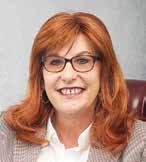



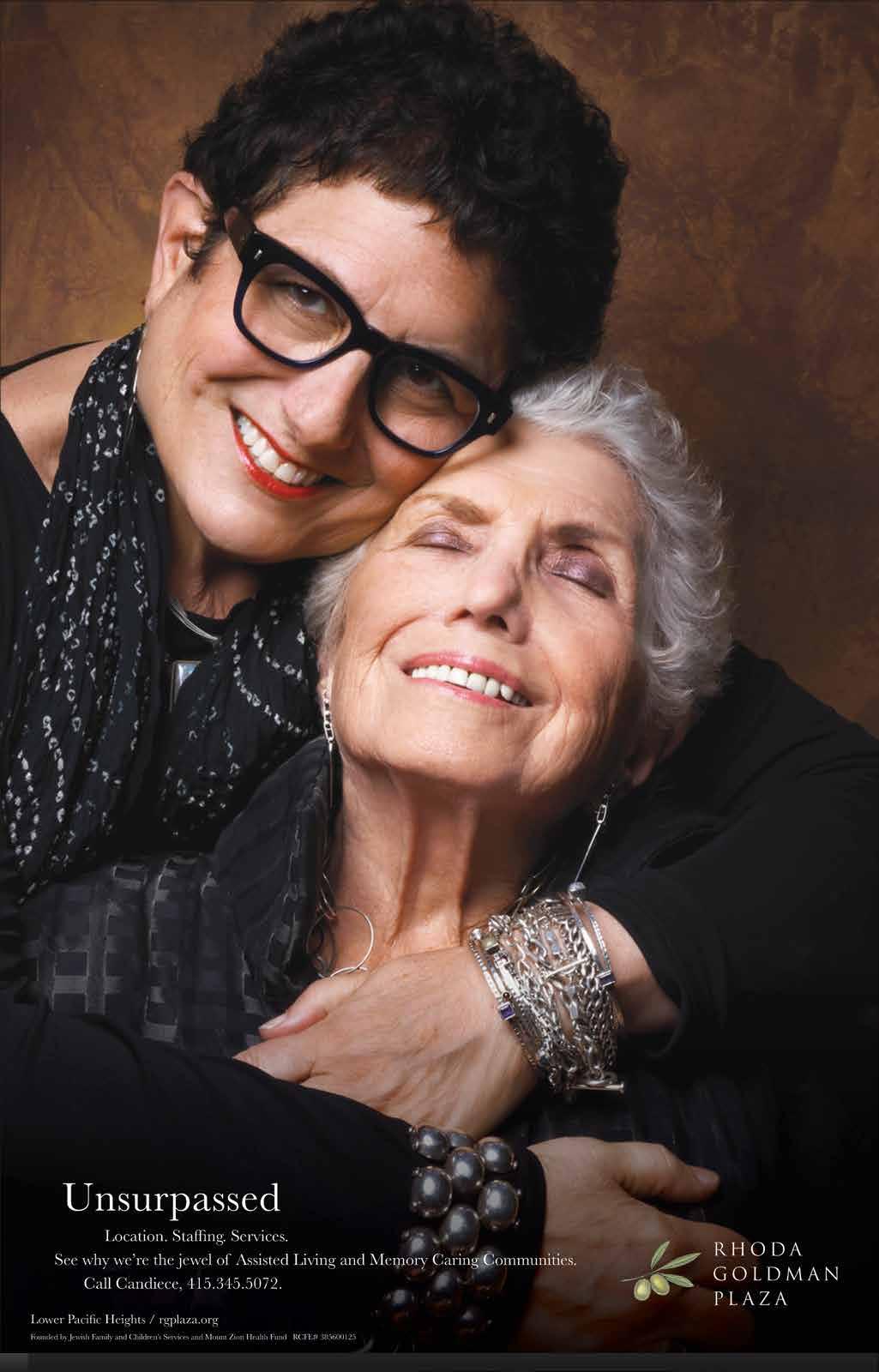
As founders of The Port Bar, a vibrant LGBTQ+-focused establishment that has survived and thrived through the pandemic and beyond, Richard Fuentes and Sean Sullivan are bar industry veterans who have earned their stripes. With the opening of the 5,000-square-foot venue, Fluid510, they are making a splash and expanding their nightlife offerings to create an inclusive and sophisticated gathering space.
Partners in life and in business, the duo are well matched to bring hospitality concepts to life while pushing boundaries and setting new trends in the industry. Fuentes’ recognition as one of 40 under 40 by the San Francisco Business Times in 2016 highlights his exceptional leadership and entrepreneurial skills. Sullivan’s distinction as a “Playmaker” by the San Francisco Super Bowl 50 Committee demonstrates his talent and creativity in the realm of mixology.

Their shared belief in Oakland’s potential as a vibrant and thriving city drove them to establish The Port Bar, a place that reflects the unique spirit and culture of the community. Now Fuentes and Sullivan are creating a new venture that not only showcases their passion for mixology and hospitality but also contributes to the vibrancy of the Oakland community. Fluid510 will welcome patrons of all backgrounds to gather and celebrate in a versatile space serving exceptional food.
I recently spoke with them for the San Francisco Bay Times about this new East Bay destination.
Carole Barrow: Can you share your founder story and any details that make the Fluid510 story unique?
Sean Sullivan: Richard inspires me to be a go-getter and to actually live the dreams that I have in my head to make them a reality. As founders of The Port Bar, Ritchie and I were tuned into the community and what is needed to serve it—Fluid510 would be filling a very important niche. Along with being local business owners, we have been very active members of the community in Oakland, to the point where many people have seen us as community champions, and we’ve embraced that.

I believe The Port Bar has been so well received because of our love for the community. We built it with input from feedback groups, ensuring we were hearing what people wanted, so we’ve always been plugged into the community.
We are very hands-on, and you’ll see us at The Port Bar several nights a week. We greet customers like old friends, so we’ve always made it a family welcoming experience. And we’ve had such great success with it that, prior to the pandemic, we saw that we were getting even busier to the point where we really hit a critical mass. We didn’t have the space for everybody. So, we knew we would have to find a new space, and that is where the search for Fluid510 began.
Richard Fuentes: Yes, creating Fluid510 was a labor of love. And most importantly, we had stakeholder
By Carole Barrowmeetings when we created The Port Bar, which really is what led to the place’s design. We incorporated the community feedback into the creation of Fluid510 as well.

So, with Fluid510, we very much wanted to create a space that was for everyone. Having
The Port Bar as an LGBTQ+ destination has worked very well. We don’t plan on moving any of our programming from The Port Bar to Fluid510.
Since Fluid510 is a space for everyone, we want to make sure that Oakland’s melting pot is reflected within the space. And by that I mean that we’ll have some nights at our program for LGBTQ+, and we’ll have other nights where folks can rent out the venue, for example, for a whole buyout. We will host comedy shows, or we will do DJ brunches on the weekend. We have elevated food that is another difference from The Port Bar—we will serve creative, high-end food on the premises.
Carole Barrow: What is your long-term vision and strategy for The Port Bar and for Fluid510?
Richard Fuentes: Our goal is to continue The Port Bar’s operations next to the iconic Paramount Theater. And we plan to keep expanding the programming that our customers have come to love, which is what we’re known for; especially the drag shows that we have. We also have gay drag on Wednesdays, and we have our gay drag brunch on Sundays.
Our drag brunch began during the pandemic, because we had to be outdoors. We built our parklet because we saw that people really wanted to be outdoors and be safe while still enjoying some comic relief. That worked really well for us, and we want to continue to do that.
And as for Fluid 510, we’ve seen that there has been a need of the nonprofit community and small companies
and large companies in Oakland to have spaces here where they can gather and host happy hours after work. But The Port Bar has been limited in capacity to about 100 people, while at Fluid510, we will be able to host up to 250 people. So, that really changes the dynamic of the experience that we will be able to provide to our customers.
Carole Barrow: Is The Port Bar’s drag programming more important than ever, given the current anti-drag and anti-trans legislation sweeping red states?
Richard Fuentes: Yes, absolutely! You know, you don’t have to go so far from the Bay Area to find people who are anti-trans and anti-drag, so sending a strong message and being right next to the Paramount Theater on Broadway broadcasts the message that the LGBTQ+ community is here, and we’re here to stay. We’re not going anywhere. And I think that’s key for our role here at The Port Bar. But with the role of Fluid510, I think it allows us to continue what we’ve done at The Port Bar, while we also aim to make this an inclusive space for all kinds of different folks; they might be gay, they might be straight or anything at all on the spectrum. The goal is basically to be able to have a space that is for everyone. So, we continue to expand, and people continue to enjoy the programming that they’ve seen, not only at The Port Bar, but they’ll also see new programming that is fluid.
Carole Barrow: What is your main message to the Oakland community and future customers from throughout the Bay Area and beyond?
Richard Fuentes: Fluid510 is a space for everybody. We encourage everyone to join us.
Carole Barrow: What would you say to potential patrons from San Francisco? Why should they make the trip to spend time at Fluid510?
Sean Sullivan: When it comes to getting here, if they don’t want to get on a bridge, they won’t have to, because we’re in between the 12th and 19th Street BART stations, so it is very convenient for folks to come across the bay.
Just as San Francisco residents probably feel that their city is getting maligned in the press for issues that may be concentrated in a few neighborhoods, they should have that kind of openness towards Oakland. While we are a major U.S. city that has the same problems every other major U.S. city has, we have great diversity here. And the great energy of the Bay Area spirit that is shown here is across so many different-looking faces. That melting pot is reflected in the faces of our patrons—a lot of people of color come here from San Francisco because they enjoy the diversity. That diversity spills out into the streets and into our establishments. Also, you have a lot of other great institutions, including the Fox Theater and The Paramount. Fluid510 is a place for those people to keep the energy going after the show. And although we really are very bullish about the food experience that we have coming up at Fluid510, it’s more elevated bar food. For folks looking for a full sit-down dining experience, there are also incredible restaurants like Duende and Calavera to visit before spending the rest of the night with us. And after a couple of drinks, you might need one of our delicious Fluid510 pizzas, paninis, or other gourmet bites. So, if you’re ready to get your dance on, have a craft cocktail, and a beautifully prepared bite, we’re definitely your spot.
Carole Barrow: What kind of dining experience should customers look forward to?


Richard Fuentes: We’re bringing an elevated experience to Fluid510 by having a world-class kitchen, which is pretty unique to the area. In addition to our pizzas, we will have paninis and desserts like tiramisu, along with gelato. For that after-work crowd that wants to stick around and enjoy, we have a happy hour menu every day that runs until 9 pm. We are also going to have a small menu of happy hour items available throughout the day to capture a lot of the people who are living and working in downtown Oakland. So, it’s a way to encourage people to come out and enjoy the neighborhood.
Fluid510 opens on May 20. For more information, visit www.fluid510.com

Carole Barrow is an Account Director at the San Franciscobased firm Bospar.

Saturday, May 20, 8pm

Freight & Salvage, 2020 Addison, Berkeley







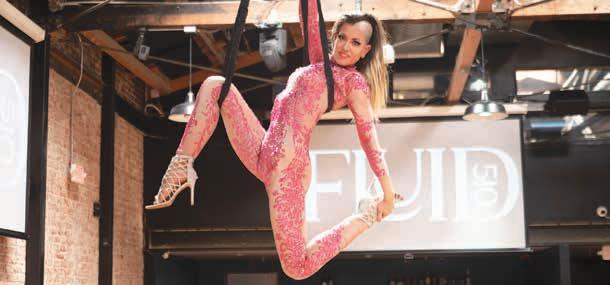

Jennifer Berezan with an all-star band including: Anthony Costello, Barbara Higbie, Chris Webster, Christelle Durandy, Damond Moodie, Daniel Roy, Don Benedictson, Julie Wolf, Melanie DeMore, Matteo Quale, Murray Pulver, and more!



Fluid510 (continued from Page 1)
Special thanks to Photographer Karina Patel
The Pacific Center for Human Growth, the oldest LGBTQIA+ center in the Bay Area, has been quietly operating the only sliding scale mental health clinic for LGBTQIA+ people and their families in Alameda County for the past 50 years. Now we are ready to come out (again) loud and proud, with a new home, a new executive director and executive team, and the message: “We’re Still Here, We’re Still Queer, and We’re Turning 50!”

I recently spoke with Executive Director Lasara Firefox Allen about the Pacific Center’s proud legacy and what the future holds.
Sharon Knight: Please tell us about yourself, your background, and why you were drawn to work with the Pacific Center.
Lasara Firefox Allen: My background is in social work and grassroots activism. I’m queer identified and have many queer family members. I was drawn to this position because it was an opportunity to both serve and work with my LGBTQIA+ community.

Sharon Knight: How did you and the Pacific Center find each other?
Lasara Firefox Allen: I was ready to make a move back to the Bay Area
from Mendocino County. I had heard many good things about the Pacific Center over the years, and when I found the job opening and researched the organization, I found so many points of alignment that I really couldn’t pass the opportunity up.

Sharon Knight: Can you give an example of one of these points of alignment?
Lasara Firefox Allen: Pacific Center is a legacy organization with a young and increasingly diverse organizational culture. Pacific Center has hired several new team members in the past few years—at the directors’ level and throughout the organization—with a conscious focus
on BIPOC (Black, Indigenous, People of Color) representation. We have an amazing team who are dedicated to Pacific Center and our community.
Taunya Black—who is being honored with our Culture Shift award at our upcoming 50th gala on June 3rd— was instrumental in spearheading an effort to rewrite Pacific Center’s Mission, Vision, and Values statements in order to reflect racial equity as a central value of the organization. Our equitable hiring focus is one of the outward manifestations of that organizational work. As a white coconspirator, I agree with this ethical
value, and believe that representation is key.
Another area of alignment is that our organizational culture encourages everyone with whom we work to show up as their whole selves. We employ from our community, with our community in mind. It is a peer-focused organization, and lives into the “nothing about us, without us” ethos. The overall diversity of the staff was, and is, a very attractive and alive aspect of the organization for me.
Sharon Knight: The Pacific Center was founded in 1973 by Jim Green and Richard Boxer. What was the motivation for creating the Pacific Center?
Lasara Firefox Allen: According to the community stories I’ve heard, the Center was formed in response to a brutal gay bashing that happened in Oakland. I’ve also heard that it was founded as a response to folks being tired of only having bars as a meeting place. And indeed, having a space for our community to meet that’s not oriented around alcohol is important to this day.
The organization began as a community center. Our therapeutic services were added later. When the HIV/ AIDS crisis began, the Pacific Center was here as a support. The Center has really been here through thick and thin for the East Bay LGBTQIA+ community.

Sharon Knight: Do you think the founders would be proud of what the Pacific Center has accomplished since its inception?
Lasara Firefox Allen: I hope so! I have had several folks from the organization’s past coming around and checking in, and that has felt really affirmative. And [former Executive Director] Leslie Ewing remains engaged, and I feel like that counts for a lot.

Sharon Knight: Can you share an instance with us?
Lasara Firefox Allen: There have been five long-standing couples who have gotten in touch since I’ve been here, all of whom met through the
(continued on page 18)


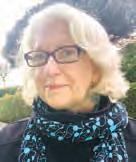
One of the most popular parlor games these days is bemoaning the demise of San Francisco. It’s hard to pick up any publication without seeing an article about how the city has become a raging hellscape, and we’re all about to collapse into a heap of crime and decay.
To which I say: Get a grip, folks. Yes, the city is facing serious problems that aren’t necessarily being addressed as quickly or efficiently as they should. Guess what? None of this is new, and San Francisco isn’t alone. Homelessness is not a uniquely San Francisco problem; plenty of cities (and even rural areas) are grappling with housing crises. Too many stores closing? It’s happening nationwide, as too many people do their shopping online, leaving local stores to struggle. Crime? Don’t read NextDoor—it will simply give you nightmares.
My standard answer to almost anything that bothers you is simple: Don’t just bemoan the problems. Be part of the solution.
I’m no Pollyanna. The problems we face are real, and require serious work. But what makes San Francisco
the streets of the Tenderloin. Recent data shows that this is a citywide problem, with overdoses happening in every neighborhood.
Two local community organizations are stepping up to help by offering free workshops to teach the public how to recognize and respond to these emergencies, since people at music and entertainment venues are particularly susceptible to drug overdoses. As the invitation says, “Lots of venues and bars now carry naloxone in case of emergency, but it doesn’t work unless someone knows how to help.”
Both trainings are scheduled for May 24 From 7–8 pm. Community radio station BFF.FM is teaming up with the San Francisco Department of Public Health to present a free training on Overdose Recognition and Response. Eileen Loughran, Director of the Office of Overdose Prevention at the SF Department of Public Health, will cover how to identify someone in distress, how to respond, and how to administer naloxone.

Admission is free, but registration through Eventbrite is required.
https://tinyurl.com/BFFFMnar
with Alzheimer’s, chances are you know someone who does, or perhaps someone who is caring for someone with the disease. In California alone, there are 1.6 million people providing unpaid care for a person with Alzheimer’s.
There is currently no cure for Alzheimer’s. But Medicare has blocked access to FDA-approved treatments that can be beneficial, particularly to people in the early stages of Alzheimer’s. Medicare covers all
so special—beyond our fabulous vistas and ocean breezes—is the people. And there are plenty of people left in this city who haven’t given up on San Francisco. Each of us can do something that will help, from picking up trash to helping an ailing neighbor. Let’s prove the naysayers wrong, and restore the magic to our city.
Free Trainings: Overdose Recognition & Response
A couple of weeks ago I fell at work. It was a hard fall, and I was down for the count for quite a while. But I was fortunate that there were co-workers on hand who were well-versed in basic first aid, and knew what to do until the EMTs arrived.
A city that cares is filled with people who know how to take care of each other. A working knowledge of basic first aid should be part of everyone’s toolkit: you never know when you will come upon someone who needs immediate help. Knowing what to do when someone falls, or is bleeding, or suffers a medical emergency like heart attack or stroke, can save a life in those crucial first minutes.
Sadly, one of the most frequent emergencies in our city today is drug overdoses. The statistics are devastating, and eye-opening. Over the past two years, far more people have died of drug overdoses in San Francisco than from COVID-19. It is a leading cause of death in our city, but it is also preventable. And despite public perceptions, it isn’t just happening on
On the same night, from 6–8 pm, the LEATHER & LGBTQ Cultural District and harm reduction advocate Kochina Rude are partnering with Oasis to present a training open to the general public. This is their second year of responding to the overdoses in our community of hosting Narcan trainings, but previous events have been limited to entertainment venue staff. Each participant will receive a two-pack of Narcan. The event is free, but Eventbrite registration is required so they know how many Narcan packs to supply.

https://tinyurl.com/LLCDNarc
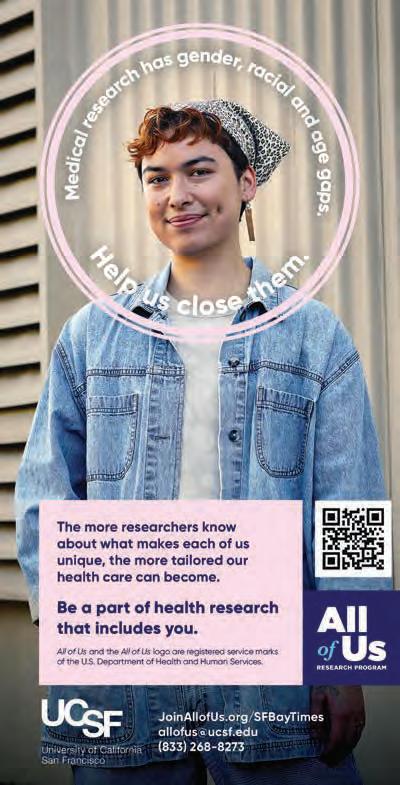
These workshops are great examples of San Franciscans stepping up to help provide solutions to the problems in our city.
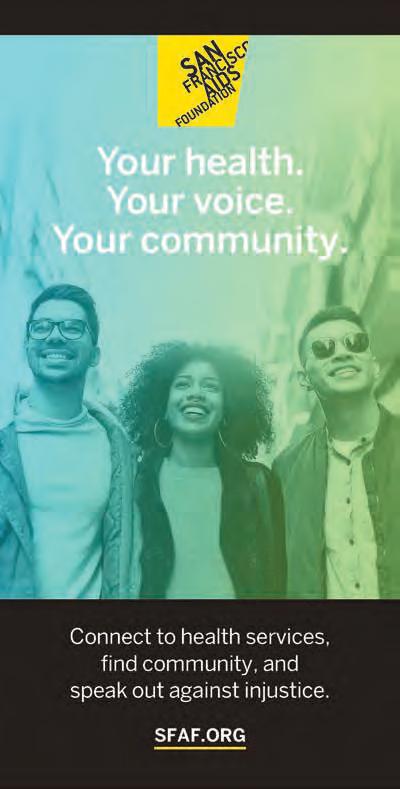
Action Alert: Rally for Access to Alzheimer’s Drugs on May 24
Imagine being told there was a medicine that could help you live longer, and live your life more fully. Then imagine it being snatched away, because you were not deemed “eligible” for it. That’s the situation that people with Alzheimer’s find themselves in, so a rally is being planned in San Francisco on May 24 to fight for access for all who need it.
In 2019, there were 18,749 people in San Francisco diagnosed with Alzheimer’s. By 2040, that number is expected to more than double, to over 37,000. This is a public health crisis. If you don’t currently know someone
FDA-approved drugs, except those for Alzheimer’s. Access to these treatments means a person living with dementia has the possibility of a longer, fuller life, including time to hope for a cure. The thing is, every day without access to these FDA-approved drugs, more than 2,000 people transition to a more advanced stage Alzheimer’s where they are no longer eligible for treatment. This is a preventable tragedy.
The Alzheimer’s Association is organizing a Rally for Access on Wednesday, May 24, at 11:30 am at the CMS Western Regional Office at 90 7th Street in San Francisco (aka the Federal Building). There will be signs and a sign-making station at the rally site from 10:30–11 am. Bring photos of your loved ones to personalize your sign, and be prepared to share your story.
Alzheimer’s or other dementias touch almost every family. Don’t know anyone with Alzheimer’s? Just wait—you will. This is an issue that affects all of us, whether you are a patient, a caregiver, a friend, a co-worker, a business owner. Register for the rally here: https://tinyurl.com/ALZRally
Hitting the Streets for Heklina
Heklina was larger than life, and so, as it turns out, is her memorial. The original plans for an indoor event at the Castro Theatre imploded when the tickets sold out immediately. Clearly, no one theatre, not even the mighty Castro, could hold Heklina’s legions of fans. The solution? Take it to the streets.

So, Heklina’s memorial on May 23rd will be live-streamed from the stage of the Castro Theatre to two giant screens outside the theatre on Castro Street. Pro tip #1: Get there early.
(continued on page 18)

The U.S. Supreme Court recently ruled in favor of a transgender migrant woman from Guatemala who is seeking asylum in a 9–0 decision, reversing a panel from the highly conservative U.S. Court of Appeals for the Fifth Circuit. “Wow!” I hear you saying. “A decision in favor of a transwoman! A would-be immigrant! And it was unanimous?”
Yes, yes, and yes, but before you get too excited, the opinion concerned one of those arcane matters of federal procedure and had nothing whatsoever to do with transgender rights, immigrant rights, religion, or any of the knotty constitutional issues we so love to untangle. It could have been about a rich cis-gender white supremacist from Switzerland and we would still have wound up with the same consensus—to wit, the asylum seeker was not obliged to seek review of her rejection by the Board of Immigration Appeals before turning to the Fifth Circuit for help.
Meanwhile, we are nearing the final weeks of the current High Court session, which means the opinion in the case of the Colorado web designer is drawing closer. This is Lorie Smith, the woman who is asking whether or not she can skirt Colorado’s LGBTinclusive civil rights law by offering her wedding website services to heterosexual couples only. After releasing a muddled decision in the infamous Masterpiece Cakeshop case several years ago, the justices will have another chance to tell us that our civil rights laws are not worth the paper they’re printed on in the face of a religious challenge.
Or not. Who knows? All opinions are due by the end of June. (Oh, we all know.)
Speaking of the Fifth Circuit, be ready for the appellate court we love to hate to issue a ruling on the merits of the dispute over mifepristone. Oral arguments are scheduled May 17, as we go to press, and the eventual outcome won’t be pretty. The three-judge panel scheduled to hear this abortion pill case is a trio of right-wingers, and you recall that this is the court that drastically restricted the drug before the Supreme Court put all lower court rulings on hold for the duration of the litigation.
Presumably, whatever the Fifth Circuit comes up with will go back up to the High Court, where one hopes legal sanity will prevail. The notion that a court can reach back decades, second-guess the scientific experts who advise the Food and Drug Administration, and reverse approval of a safe and critical drug is beyond bizarre. I know we have six conservatives on the Court, but we only have two complete lunatics.
And no, it’s not a gay thing. But the attack on birth control and women’s reproductive health is a function of the same sanctimonious pandering to a narrow Christian viewpoint that is similarly applied to our community.
Finally, before we move on from legal news, there’s another technical ruling in our favor in a transgender rights case out of Iowa. Back in 2019, the Iowa legislature passed a measure designed to opt out of paying for gender transition care under the state Medicaid system. Two transwomen
By Ann Rostowsued, and in 2021, a state court ruled that the measure violated the state constitution. The women were treated, but the state appealed this lower court ruling on principle. On Friday, May 12, the state supreme court ruled that the underlying case was moot, since the treatment had already been provided.
So that’s nice, sort of. On the other hand, the previous Wednesday, Iowa Governor Kim Reynolds signed two anti-trans bills into law, one that ends transition care for minors, and another that forces public school students to use birth-gender bathrooms.
The whole school bathroom issue is a live debate in the federal appellate courts and likely headed to the High Court sooner rather than later. Two appellate courts have ruled in favor of trans students, while a third has ruled against our side. Usually, when any of the 12 federal appellate courts have a difference of opinion, the Supreme Court steps in to resolve the matter. Keep in mind as well that the federal appellate courts are also battling over the question of whether trans women and girls can play high school sports. That’s also on the High Court’s horizon.
Oh my God, you guys! I just discovered the greatest lesbian ever, a Canadian woman with a wry sense of humor named Melissa Dilkes Pateras who lives in Massachusetts. Pateras, also known as “The Laundry Lesbian” offers household tips and accomplishes intricate do it yourself projects on Instagram and TikTok that you have to check out at once. She has some kids, including at least one 20-some-
thing daughter who is just as funny as her mother, judging from the quiz she took on laundry symbols.
I was drawn to a particular link where she taught viewers how to fold a fitted bottom sheet, and a hooded sweatshirt, and I don’t mind telling you she is a genius in the area of laundry folding. I gather she has over a million TikTok followers, a well-deserved audience.
She’s also so adept at fixing and patching and painting, she makes my own personal handywoman look like a Victorian-era aristocrat, and I’m speaking of my wife who recently fixed our overflowing kitchen sink, painted our entire house, and grew a massive vegetable garden from little seeds. Part of my admiration for both these women stems from my own inadequacies in these departments, sometimes mistaken for laziness. While we’re on the subject of TikTok, I also encountered a lesbian of a different stripe, 52-year-old Carol Hatch, who is also described as a TikTok-er. Hatch is up in arms over the description of lesbians as “non-men who love non-men,” an awkward definition, I admit, but one that I’ve never heard of.
“I feel like we’re experiencing an entire new form of domestic abuse, not just against lesbians, but against women in general,” Hatch told Fox News. “We’ve been told that transwomen, which are biological men, are better than women, that we are now cisgender.” (Note: no one has “told” us any such thing.)
“And now we have young ladies who dislike themselves so much that they can’t even say the word ‘woman.’ They have to call themselves ‘non-men.’”
Really, Carol? This is news to the rest of us, and even if there are such individuals, I would hesitate to project their motives, let alone assume that self-loathing is among them. Nor is anyone insisting that trans women are “better than women.” As for tossing around terms like “domestic abuse” in this context, it makes you look a little ridiculous.
The Carol Hatch example reminds me of one of my favorite jokes, which I may have told you a few times already:
“How many lesbians does it take to change a lightbulb?”
“That’s not funny.”
Are you laughing? If not, you might personify the old stereotype that Melissa Pateras and I live to defy.
Oh, and why was Hatch speaking to Fox News? Wasn’t Rachel Maddow interested in her observations?
The Beat Goes On
Perhaps you’re thinking that the flood of anti-trans state legislative bills has abated, since I guess I’ve only mentioned the ones in Iowa so far in this column. Well, it hasn’t. It’s just that I am exhausted by the prospect of name-checking every red state on the list.
For example, I just read an article about my beloved Kansas, where lawmakers have overridden the Democratic governor’s veto to enact a law against transgender women and girls in sports, bathrooms, and domestic violence centers. Happily, they lacked the votes to override Governor Kelly’s veto of a ban on transgender
(continued on page 18)

The importance of LGBTQ+ leadership cannot be understated in today’s ever-evolving society. With increased awareness and acceptance of diverse sexual orientations and gender identities, there has never been a more critical time for LGBTQ+ individuals to take the reins of leadership. These trailblazers not only offer unique perspectives but also contribute to a more inclusive and equitable society. In this article, we will explore the significance of LGBTQ+ leadership and its impact on communities, organizations, and the world at large.
The Need for Representation
Representation matters. For too long, LGBTQ+ individuals have been underrepresented or excluded from positions of power and influence. This lack of representation has led to many LGBTQ+ individuals feeling unseen, unheard, and invalidated. However, with LGBTQ+ leaders at the helm, marginalized communities can witness a more inclusive and accepting society that embraces and celebrates diversity. LGBTQ+ leaders serve as role models for the younger generation, inspiring them to dream big and break down barriers.
When young people see someone who looks like them, who shares their experiences and struggles, they are more likely to believe in their own potential for success. This sense of belonging and validation is essential for personal growth, self-esteem, and resilience.
LGBTQ+ leaders possess a unique understanding of the challenges faced by marginalized communities, enabling them to advocate for policies and practices that promote inclusivity and equality. They are often champions of change, pushing for reforms that address discrimination, bias, and prejudice. By fostering a culture of acceptance and respect, these leaders create safer spaces for everyone, regardless of their sexual orientation or gender identity. LGBTQ+ leaders also play a crucial role in shaping organizational policies and practices. They can influence diversity and inclusion initiatives, ensuring that LGBTQ+ employees are treated fairly and equitably. In turn, organizations that embrace diversity and inclusion are more likely to attract top talent, increase innovation, and improve overall performance.
One of the most significant challenges faced by the LGBTQ+ community is the enduring stigma and prejudice that permeate society. LGBTQ+ leaders can help break down these barriers by openly
(continued on page 15)
Do you know what the letters “F.A.C.S.” mean after a surgeon’s name? The letters stand for “Fellow of the American College of Surgeons” and indicate that the surgeon has passed a thorough evaluation of both professional competence and ethical fitness. Fellows commit to placing the welfare of patients above any other consideration, to avoid division of fees with other physicians, to make fees commensurate with the services rendered, and to refrain from performing unjustified operations.
Dr. John Henry Pang of Align Surgical Associates, Inc., not only has this credential, but also is a double board-certified plastic and reconstructive surgeon. He specializes in complex genital, face, and chest reconstruction, and aesthetic surgery and body contouring. A committed advocate for transgender healthcare rights, he has appeared in many news outlets to speak on the importance of transgender people’s access to gender-confirming treatments and surgeries.
GGBA: Please tell us about your practice, Align Surgical Associates, Inc., including its mission and values

Dr. John Henry Pang: Align Surgical Associates is a dedicated multidisciplinary team of surgeons and healthcare providers passionate about delivering top-notch, personalized surgical care to our patients. We specialize in all aspects of genderaffirming surgery and plastic surgery.


As the name implies, our mission centers on aligning the mind, identity, and body, with a core practice focus on seamlessly integrating compassion with surgical excellence. We are a minority-owned and led practice that serves a diverse patient population across a spectrum of gender, sexual minority-ship, race, and socioeconomic status, continually working to improve access to high-quality surgical care for the trans and queer community. Achieving this requires extensive community engagement and involvement, and we pride ourselves on working collaboratively with patients and healthcare providers to ensure that. For those of us who identify as part of the queer community, it’s a way of actively giving back. We believe that this philosophy lends itself to a warm,
empathic touch during an otherwise vulnerable moment in our patients’ lives.
GGBA: What led to the establishment of Align Surgical Associates?
Dr. John Henry Pang: Recent studies in medical literature have identified a strong patient desire for provider congruency. To put that plainly, patients seek out and thrive with healthcare providers who share and can relate to their identities and lived experiences. As a biracial Black-Filipino gay man, Dr. Thomas Satterwhite, who founded Align, has worked to create such a space for our trans community, providing empathy, compassion, and recognition for who they are, coupled with the highest level of excellence in their care. Our practice partner, Dr. Dev Gurjala, shares this vision, and as a Korean-American gay man from a lowincome background, I feel incredibly fortunate to be a part of such a practice. I appreciate that our team at Align sits at the intersection of these identities—we’re in a unique position to provide the kind of care patients are seeking, and the kind of care they deserve.
GGBA: Can you share more about your experience having a practice in the community?
Dr. John Henry Pang: San Francisco and the Bay Area hold such a central place in the fight for queer equality and recognition. It is truly special to be a part of that tapestry and to serve in this community. Queer surgeons caring for the queer community—I never would have imagined this in my childhood! Particularly in our field of gender-affirming surgery, so many community healthcare providers— my fellow surgeons, physicians, nurses, mental health providers, social workers, patient navigators, to name just a few— also come from a diverse array of gender, sexual, racial, and socioeconomic minority backgrounds. Our practice takes seriously our role and responsibility as active members of this community. We recently held an open house at our practice to thank and celebrate our collaborators in our efforts to serve the trans community—there was just such a tremendous sense of community and a shared commitment to excellence, and really drove home
just how fortunate we are that our patients entrust us with their care.
GGBA: Why did you decide to join the GGBA, and how long have you been a member?
Dr. John Henry Pang: We joined the GGBA this past year, driven by a desire to support and celebrate the community we are a part of and serve. The GGBA is a fantastic organization that connects members and businesses with one another, demonstrating a commitment to the local community. We view these efforts as essential for the success of small businesses like ours, and to the overall well-being and prosperity of the queer community as a whole.
GGBA: What services does your business offer?
Dr. John Henry Pang: Align offers a comprehensive range of plastic surgery and gender-affirming procedures. This includes facial surgery (harmonizing each of your features), chest surgery,

Tuesday, May 23 GGBA April Board of Directors Meeting
Virtual via Zoom
5:30 pm–7:30 pm
Once a month, these fearless volunteers, aka the Board of Directors, come together as one unit to continue GGBA’s mission to serve the LGBTQ+ Small Business Community of the San Francisco Bay Area. https://tinyurl.com/4n6vfzd2

Thursday, May 25 A Second Opinion Matters: Another Look at the Employee Retention Tax Credit
Virtual via Zoom
5 pm
Take advantage of this free webinar, presented by GGBA member and partner, Sequoia Lending, sponsored in partnership with PG&E. It could mean money in the bank for your business!
Many business owners have probably heard that they don’t qualify for the Employee Retention Tax Credit. That is not necessarily true. Learn how getting a second opinion at qualifying for the Employee Retention Tax Credit could put money back into your pocket. https://tinyurl.com/y66u7xdp
Thursday, June 1 2023 Power Connect Oasis 298 11th Street, San Francisco 6 pm–9 pm
Welcome to Power Connect 2023, the signature annual event for the Golden Gate Business Association.
This year’s gala, hosted by Oasis, will have a new element, an online fundraising auction! Register now: https://tinyurl.com/3fz4u5p2
Thursday, August 24; Thursday, November 9
Chase for Business Presents: LGBTQ+ Business Certification & Readiness Series
Please join Chase for Business’ free series in partnership with the Golden Gate Business Association. Together, we will deliver curated business readiness courses quarterly to help LGBTQ+ businesses grow and scale. They will be presented at different locations around the Bay Area.
They will be hybrid events. Register for the remote option of the session(s) you want to attend. You will be emailed the remote access link before the day of the course.
August 24 (Palo Alto) Navigating Your Cashflow November 9 (Oakland) Cyber Security

https://tinyurl.com/ykfpx7tf
breast augmentation, body contouring (liposuction, “Brazilian butt-lift”), and complex genital reconstruction. Additionally, our cosmetic services encompass non-invasive procedures such as injectable neurotoxins (Botox) and facial fillers, which also happen to be a personal passion of mine. We meet you where your embodiment goals are. Come by and say hello!
GGBA: What do you enjoy doing in your free time?
Dr. John Henry Pang: I’m relatively new to San Francisco, having moved here from New York. My
(continued on page 15)

$1,498,000
Laura Martell (415)948-1282 laura@danielwinklerinc.com


Danielle Clements (510)734-1287 danielleclements9@gmail.com” Jeffrey
787 Monterey Boulevard, Unit A San Francisco









Condo with 3 bedrooms, 2 baths, private roof deck, washer/dryer, high ceilings, large windows, north facing, easy access to I-280 and 101.
$1,195,000

Jeffrey Plocher DRE #01248348 jeff@vanguardsf.com 415-272-5333 Vanguard Properties





Does it seem like, every time you think you have a handle on what the economy has in store, a new development throws a wrench right in the middle? Just me? I suspect it’s not just me, given the recent spate of bank drama SVB and First Republic are jarring on both main street and Wall Street. Even so, it’s important to have perspective and recognize the longgame is really the focus when growing your portfolio. Let’s focus on what we can control. So, how do you keep calm and carry on when it comes to your investments? Here are a few suggestions:
Keep things in perspective. Simply put, volatility is a given when you are investing. Everything from political uncertainty at home or in the far corners of the world to natural disasters to breakthrough discoveries can impact investor confidence. But history has shown us that market setbacks are typically followed by periods of recovery. Create a goals-based plan. Instead of chasing the next great investment or bailing out when stocks tank, develop an investing strategy that centers around what you want to achieve in life. Your goals are probably more stable than the markets, so a solid plan makes it easier to weather ups and downs. A goalsbased plan also removes the temptation to try market timing, where you attempt to buy when investments are low and sell when they’re high. This is challenging, to say the least, since no
one really knows where the market is headed at any given time. And it could actually end up costing you money if you get into or out of the market at the wrong time.
Diversify your investments.
Investing in different types of assets helps spread out your risk. Often when one type of investment is down, another asset class may be experiencing banner growth. For example, bonds may offer an island of stability when stocks and other equities are plummeting. Using an asset allocation strategy, you can balance risk and reward by investing in different types of assets in portions that make sense for your goals, risk tolerance, and time horizon.
Invest regularly. One of the smartest ways to combat market uncertainty is to create a regular investment schedule. You can choose any interval that works for you—weekly, monthly, quarterly, or per paycheck. The beauty of this strategy is that you invest during both peaks and valleys, which helps even things out. And this disciplined approach helps ensure that short-term downturns have minimal impact on your portfolio’s ultimate performance.
Review your investments often.
Bob Dylan wrote that “the times they are a-changing” back in 1964, and that’s as true now as it was then. The world is ever fluid and your investments may need to change too, to reflect new realities. An annual review of your portfolio can help make sure your investments take advantage of new opportunities, while still aligning with your ultimate investment goals. Turn to the professionals. You may have read through all of these suggestions and still not be totally comfortable making important investment decisions yourself. No worries. A financial advisor can help you sort through the myriad options and create an investment strategy that works best for you. If you are nervous about your investments, especially when the market makes a major correction and drops precipitously, you might be in
Understanding Elder Care Planning
Jay Greene, Esq., CPA

In the April 20, 2023, issue of the San Francisco Bay Times, I provided a detailed primer on elder care planning. For this issue, I offer a summary of some of the most critical areas to consider. As a brief introduction, I’m an estate planning attorney and I focus on elder care planning in my practice. As we age, it’s important to start thinking about our future care needs and take steps to ensure that we are taken care of.
That’s where elder care planning comes in—it’s a comprehensive process that covers all aspects of our lives and helps us plan for our future. In this article, I’ll be covering everything you need to know about elder care planning, including healthcare and financial considerations, legal documents, and family dynamics.
the wrong ones. A financial professional can help you find assets that are a better fit for your risk tolerance. They can also make sure your investments reflect your values (a focus on environmentally sustainable investments out of your portfolio, for example), and advance you toward your goals.
Whether you turn to professional help or invest on your own, the main thing to remember is that a solid financial plan that is based on your goals provides one of the best antidotes to the anxiety caused by a roller-coaster investment market.
The opinions expressed in this article are for general informational purposes only and are not intended to provide specific advice or recommendations for any individual or on any specific security. It is only intended to provide education about the financial industry. To determine which investments may be appropriate for you, consult your financial advisor prior to investing. Any past performance discussed during this program is no guarantee of future results. Any indices referenced for comparison are unmanaged and cannot be invested into directly. As always please remember investing involves risk and possible loss of principal capital; please seek advice from a licensed professional.
Brio Financial Group is a registered investment adviser. Advisory services are only offered to clients or prospective clients where Brio Financial Group and its representatives are properly licensed or exempt from licensure. No advice may be rendered by Brio Financial Group unless a client service agreement is in place.
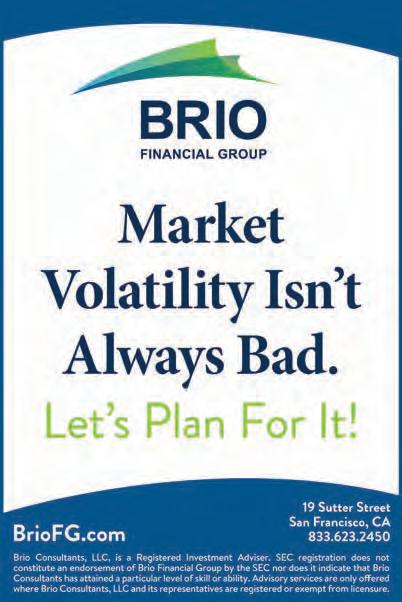
Brandon Miller, CFP®, is a financial consultant at Brio Financial Group in San Francisco, specializing in helping LGBT individuals and families plan and achieve their financial goals.


Elder care planning is all about planning for our future care needs. It involves considering all aspects of our lives, including our healthcare, finances, and legal documents. It’s important to start planning early, even if you don’t anticipate needing care for many years. A client didn’t think she needed a plan until she fell ill unexpectedly and was unable to make decisions for herself. The lack of planning caused tremendous problems for her and her loved ones. It’s always better to be prepared, even if you never need to use the disability side of your plan.
Healthcare Considerations
When it comes to healthcare, there are many options to consider, including in-home care, assisted living, nursing homes, and more. It’s important to choose the right healthcare provider for your needs, and that can take time and research. I had a client who initially chose a nursing home for her mother because it was the closest to her home. After a few weeks, she realized that the nursing home wasn’t providing the level of care her mother needed, and she had to move her to a different facility. Taking the time to research your options and ask for recommendations can make all the difference in your quality of life. Using the expertise of placement agencies is paramount to making a well-informed decision.
Planning for long-term care can be expensive, but there are steps you can take to help mitigate those costs. One of my clients was concerned about the high cost of long-term care and didn’t want to rely solely on Medi-Cal to cover those expenses. We discussed the option of setting aside money specifically for long-term care expenses with their financial advisor, and she felt much more at ease knowing that she had a plan in place that her trusted advisor was going to help her manage. Other options to consider include long-term care insurance and life insurance with a long-term care rider. Estate planning considerations, such as trusts and gifting strategies, can also help you plan for your financial future and protect your assets from the expense of long-term care.
Key legal documents in elder care planning include your trust, power of attorney, healthcare directive, and last will and testament. These documents can help ensure that your wishes are respected in the event that you become incapacitated or pass away. It’s important to ensure that these documents are up-to-date and legally valid. I had a client who thought that her documents were in order, but it turned out that they weren’t legally valid because they hadn’t been updated in years and did not meet the legal requirements for validity of the documents. It’s crucial to work with
(continued on page 18)

Unstoppable. That’s the word that summed up our feelings about the Japanese LGBTIQ movement after participating with over 200,000 other people in the recent 2-day Tokyo Rainbow Pride celebrations. A large rainbow festival took place on both Saturday, April 22, and Sunday, April 23, in Yoyogi Park, near the very popular and trendy Shibuya and Harajuku districts in Tokyo. Marches through these busy neighborhoods took place on both days.

Saturday was the Tokyo Liberation March, an intersectional march whose message was the need for society to embrace all minority groups on their own terms as different from the dominant majority culture. The march included diverse Japanese minority groups, such as Ainu, the indigenous people of northern Japan, and emphasized how minority groups should not have to prove their resemblance to the majority in order to be respected and be free from discrimination. This message of liberation is especially meaningful and powerful in Japanese culture, where pressure to adhere to perceived public norms is immense and constrains not only LGBTIQ people, women, and other visible minority groups, but indeed also any Japanese person who does not want to conform to apparent societal expectations.
Sunday was the Pride Parade, featuring numerous contingents and floats. Marriage For All Japan, was

one of the largest contingents, composed not only of queer couples and LGBTIQ activists, but also of members of the Japanese parliament, known as the Diet. Numerous community groups participated in the march along with multiple domestic and international companies, who also had booths at the festival.
Corporate support for LGBTIQ equality is crucial in this nation, in which business plays an outsized role in political life. But we were very pleased to see that community groups marched first in the parade with business groups following later.
Perhaps most politically significant about this year’s pride events was the outspoken presence of numerous ambassadors from G7 countries and other pro-LGBTIQ countries who spoke forcefully about the need for equality in Japan as well as elsewhere in the world. The eyes of the world are on Japan this week as the annual G7 conference opens on May 19 in Hiroshima. As readers of this column may know, Japan is the only G7 country without either marriage equality or civil unions, with five of the seven nations having full marriage equality. A 2020 OECD report found that Japan was next to last, just above Turkey, of the 35 OECD counties when it came to LGBTIQ legal rights.
British Ambassador Julia Longbottom, whose daughter recently married her wife in the U.K., gave a powerful and personal appeal for equality. Dutch Ambassador Peter van der Vliet took a not-so-subtle jab at the ruling Jimintō (LDP) party, which is now scrambling before the
G7 conference begins to try to pass an LGBT “understanding” bill that still provides no substantive legal protections for queer people. The ambassador proclaimed that “better understanding is the starting point not the goal. Discrimination in any form is not part of free society.”

Argentinian Ambassador Guillermo Hunt gave inspirational remarks about his nation’s leadership on marriage equality, recognition of gender identity, and non-binary people’s rights. Many ambassadors invited festival attendees to visit their nations’ booths at the festival.
U.S. Ambassador Rahm Emanuel’s turn to speak came last, and he took full advantage of it. He thanked the crowd for their patience in staying attentive for all the speeches, a virtue for which Japanese people are famous. But he immediately entreated queer people not to be patient when it comes to equality.
Emanuel explained that the U.S. also had a booth at the festival, but he boldly implored the crowd not to stop
at the booth, but instead to march right on by and into the streets to make their voices demanding equality heard. Two days later he followed up with a tweet: “The equality countdown begins now. As I said at Tokyo Rainbow Pride and will say again: no one should have patience when it comes to equal rights for all. This is the time; this is the moment to have your voices heard and our values adhered to ... .”
In addition to his impassioned rhetoric, Emanuel also sounded a softer tone both at Pride and on Twitter. At Pride, he praised Japan as a beautiful home with people with beautiful hearts, urging the government to open that welcoming home to all people. And on Twitter he echoed: “It’s time for a new era where members of the LGBTQI+ community feel at home in” both countries, recognizing that the full equality had not yet been achieved on either side of the Pacific.
(continued on page 15)
I am saddened to announce the death of Mary P. Sager, 78. She passed away after a short illness at her San Francisco home on April 22, 2023, with her partner, Michelle Jester, by her side.
Mary grew up in Wisconsin and cherished her many memories and good friends from those days. When she came to California, she found a home where she could express her sense of adventure and freedom.


Mary was the longtime partner of lesbian pioneer Rikki Streicher [owner/operator of groundbreaking, historic lesbian bars Maud’s and Amelia’s, and a co-founder of the Gay Games] until Rikki’s death in 1994. She spent the last two decades with her partner, Michelle.



She enjoyed a long and happy teaching career, which flourished because of her special rapport with children.
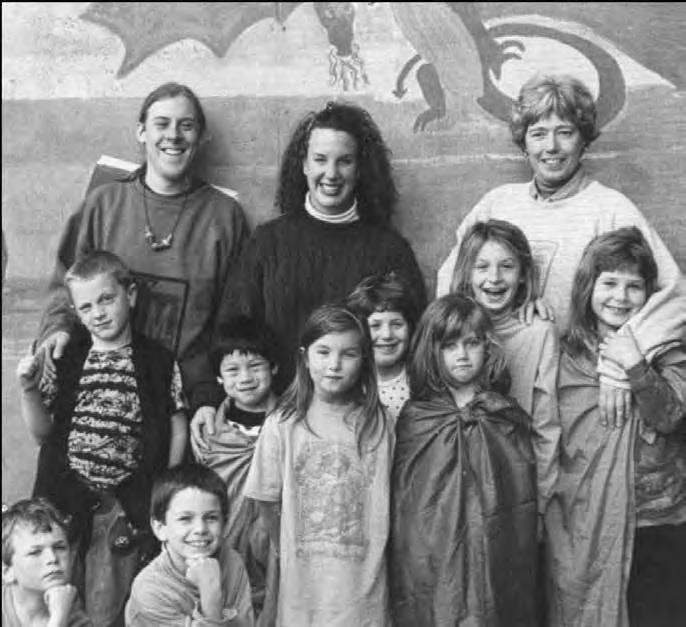

Mary always enjoyed walking her beloved dogs in the city’s many beautiful places, especially Stern Grove.
She was a vibrant member of many of San Francisco’s communities and supported a wide variety of charities. Donations in her memory to St. Jude Children’s Research Hospital or the San Francisco SPCA would be appreciated.
St. Jude Children’s Research Hospital: https://tinyurl.com/4v3btz64
San Francisco SPCA: https://tinyurl.com/589w79ar
Susan Fahey of Maud’s Reunion ( https://tinyurl.com/ysnzhyfe ) was the former Bar Manager at Maud’s, the historic lesbian bar at 937 Cole Street that o pened in 1966 and closed in 1989.
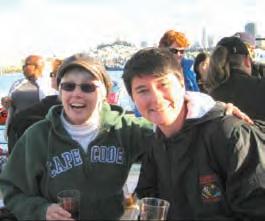
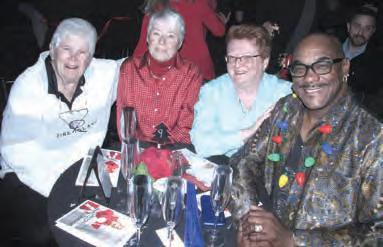

 By Susan Fahey
By Susan Fahey
Roland Schembari and Bill Hartman, Co-Founders
Randy Alfred, Founding News Editor
1978
Kim Corsaro, Publisher 1981-2011
2261 Market Street, No. 309
SaN FraNciSco ca 94114
PhoNe: 415-601-2113
525 Bellevue aveNue oaklaNd ca 94610
e-Mail: editor@sfbaytimes.com www.sfbaytimes.com
The Bay Times was the first newspaper in California, and among the first in the world, to be jointly and equally produced by lesbians and gay men. We honor our history and the paper’s ability to build and strengthen unity in our community.
The Bay Times is proud to be the first and only LGBTQ newspaper in San Francisco to be named a Legacy Business, recognizing that it is a longstanding, community-serving business that is a valuable cultural asset to the city.
dr. Betty l. SullivaN
JeNNiFer l viegaS co-PuBliSherS & co-editorS
Beth greeNe, Michael delgado, JohN SigNer, aBBy ZiMBerg deSigN & ProductioN
kate lawS BuSiNeSS MaNager
Blake dilloN caleNdar editor
kit keNNedy Poet-iN-reSideNce
J.h herreN techNology director

carla raMoS weB coordiNator
Mario ordoNeZ diStriButioN
JuaN r davila voluNteer coordiNator
WRITeRS
Rink, Sister Dana Van Iquity, Ann Rostow, Patrick Carney, Carolyn Wysinger, Leslie Sbrocco, Heather Freyer, Kate Kendell, Heidi Beeler, Gary M. Kramer, Joanie Juster, Julie Peri, Jennifer Kroot, Robert Holgate, Eduardo Morales, Dennis McMillan, Tim Seelig, John Chen, Rafael Mandelman, Tabitha Parent, Jewelle Gomez, Phil Ting, Rebecca Kaplan, Leslie Katz, Philip Ruth, Bill Lipsky, Elisa Quinzi, Liam Mayclem, Donna Sachet, Gary Virginia, Zoe Dunning, Derek Barnes, Marcy Adelman, Jan Wahl, Holly Near, Stuart Gaffney & John Lewis
Brandon Miller, Jamie Leno Zimron, Michele Karlsberg, Randy Coleman, Debra Walker, Howard Steiermann, Andrea Shorter, Lou Fischer, Brett Andrews, David Landis

PhOTOgRaPheRS
Rink, Phyllis Costa, Sparks, Paul Margolis, Chloe Jackman, Bill Wilson, Jo-Lynn Otto, Sandy Morris, Karina Patel, Abby Zimberg, Joanie Juster
aDVeRTISINg
Display Advertising
Standard Rate Cards http://sfbaytimes.com/ or 415-503-1375
Custom ad sizes are available. Ads are reviewed by the publishers.
National Advertising: Contact Bay Times / San Francisco.
Represented by Rivendell Media: 908-232-2021

Circulation is verified by an independent agency
Reprints by permission only.
CaLeNDaR
Submit events for consideration by e-mail to: calendar@sfbaytimes.com


© 2023 Bay Times Media Company
Co-owned by Betty L. Sullivan & Jennifer L. Viegas
The news media is broadcasting the dramatic influx of people migrating in unprecedented numbers across our southern border. Title 42, which was initiated in the previous presidential administration, was supposed to expedite immigrant cases with the goal of reducing the chances of COVID-19 spread throughout the U.S. On May 11, 2023, Title 42 implementation ended at midnight and Homeland Security is implementing the standard Title 8 for processing asylum cases.
Immigrating to the U.S. is complicated and confusing. The major crises are mostly on the southern border of the U.S., with large numbers of people mostly from Central and South America seeking asylum here due to the dangers they face in their own countries. Among this group seeking asylum are LGBTQ+ individuals. This article will attempt to clarify the immigration process for such individuals and highlight the challenges concerning it moving forward.
Phase one of this process is entering the U.S. through its borders legally and documented as seeking asylum to avoid being abused and killed in their own countries. Typically, in the past, people entering the U.S. for asylum would have a sponsor assigned to them by a sponsoring agency to
ensure their process has a successful and desired outcome. Being a sponsor required making sure that housing and sustenance are available for at least 6 months while the new immigrant finds employment and can establish themselves.
This partnership as a sponsor provided the mentoring and guidance needed for understanding the socialization expectations in the U.S. and to navigate the use of resources for being stable and established in this country.

Given the large volume of immigrants, however, Homeland Security apparently changed its procedures by initiating other mechanisms to speed up asylum cases. Now, unfortunately, new immigrants are left to their own devices and means to become socialized and integrated into the U.S.
It is unclear why Homeland Security does not put out a call for citizens, who were successful past sponsors, to assist the department during this time of crisis. Various cities throughout the U.S. have exhausted their resources to provide necessary help that includes housing and medical attention. The situation has then forced some to declare a state of emergency to generate more attention and resources to assist the large numbers who are entering and settling in their locales. By not appropriately updating the process, the federal government has complicated and stressed local systems and resources.
Phase two of the endeavor is to match newly arriving immigrants with stable housing and employment by employers who need their skills and services. Not having a designated sponsor for guidance makes this matching process difficult and may encourage employers to take advantage of the
immigrants’ vulnerability and lack of understanding employment laws in certain areas. Although some service agencies can offer assistance, their resources are limited, given other contractual obligations. Meanwhile, newcomers face challenges in gaining stability while in the U.S. What’s more, attending to the reporting requirements of Homeland Security is critical for those whose cases appear complex and difficult to understand.
Phase three requires immigrants to have their case properly processed by the courts so that they may obtain a permanent residence in the U.S. and eventual U.S. citizenship. Many newcomers send financial support to their families in their home countries, which reduces their own resources for their needs in the U.S.
At present, the court systems are overwhelmed with cases and people may be in a state of limbo for numerous years. The process of adjudicating their status varies greatly. I for one know of various cases that have not been scheduled until 7 to 10 or more years have passed. This causes much stress and anxiety for those seeking asylum because their status is uncertain. It is possible that the climate in their original homeland has changed, which may provide an option to
return to their country. However, many have now made ties here, are accustomed and socialized to life in the U.S., and are able to navigate systems in this country, making the option to return less desirable and feasible.
Given the increasing amount of antiLGBTQ+ legislation being implemented throughout the U.S., cities with large LGBTQ+ communities and support systems are more attractive and reliable. In San Francisco, we are lucky to have such systems in place for LGBTQ+ people to provide them with a safe haven until a final determination about their case is made.
Eduardo Morales, Ph.D. is a Professor Emeritus, retired Distinguished Professor, and current adjunct professor at Alliant International University. He is also a licensed psychologist and a founder and current Executive Director of AGUILAS, an awardwinning program for Latinx LGBTQ+. Of Puerto Rican decent, he has received numerous distinguished awards and citations, including being named a Fellow of 12 divisions of the American Psychological Association.
GGBA LEADERSHIP MESSAGE (continued from pg 9)
sharing their experiences, encouraging dialogue, and increasing understanding. By humanizing LGBTQ+ issues and fostering empathy, these leaders can help create more accepting and compassionate environments.
Moreover, LGBTQ+ leaders can challenge stereotypes and debunk misconceptions surrounding their community. By doing so, they contribute to a more accurate portrayal of LGBTQ+ individuals, allowing people to see beyond labels and appreciate the richness of the human experience.
The impact of LGBTQ+ leadership extends beyond local communities and organizations. LGBTQ+ leaders on the global stage can influence international policies and promote LGBTQ+ rights worldwide. By standing up against discrimination and advocating for equality, these trailblazers set a powerful example for other nations to follow.

The importance of LGBTQ+ leadership in today’s world cannot be overstated. By championing diversity, inclusivity, and equity, LGBTQ+ leaders contribute to the creation of a more accepting and compassionate society. They inspire others to embrace their differences and use them as a source of strength. As we continue to work towards a world where everyone’s rights are respected, and each individual is celebrated for their uniqueness, the role of LGBTQ+ leaders will remain as vital as ever.
For more information on the GGBA, please visit: https://ggba.com/
Tony Archuleta-Perkins is the founder and owner of Ide8 Real Estate & Eclat Group He has worked in finance for 25 years, ten of those years specifically as a fractional CFO. He has two master’s degrees: an MBA and a Master of Science in Real Estate. In addition to his educational and professional pedigree, Archuleta-Perkins has a passion for advocacy for the LGBTQ+ Community and their allies. He proudly volunteers and serves on two boards here in San Francisco: President of the Golden Gate Business Association and Treasurer of the LGBTQ+ Real Estate Alliance, SF Chapter. He and his husband enjoy international traveling and scuba diving.
husband Mark and I love the outdoors and the beauty of the Bay Area, and we’re exploring the many hikes and opportunities for fresh California air. Tennessee Valley is so beautiful! We’ve settled into the Castro, where we live with our kitten Mika, whom we adopted from the San Francisco SPCA shortly after our move. We’re considering a dog next! We love good food and are gradually working our way through a seemingly endless list of restaurants—we’re open to recommendations!
For more information about Align Surgical Associates: https://www.alignsurgical.com/
6/26 AND BEYOND
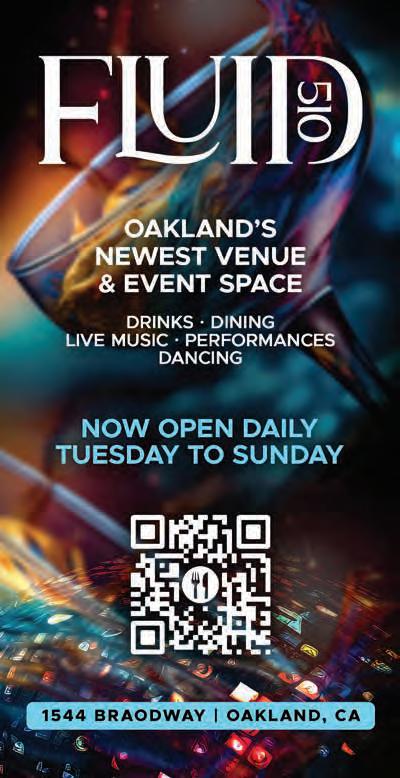
(continued from pg 12)
Emanuel’s reminder about the beauty that lies in the heart of Japanese culture and people resonates greatly with us and is the reason we are very hopeful when it comes to the future for LGBTIQ rights in Japan. Those feelings were palpable when the two final honorees took the stage at the end of the Pride festival. They were renowned 74-year-old singer and television personality Kenichi Mikawa, who is openly gay and is known not only for his music but also his outspoken opinions; and long-time LGBTIQ activist Teishiro Minami, who is now over 90 years old. Minami has been a tireless queer activist for decades, serving as chief editor for gay magazines, a leader in the fight against HIV/AIDS—and an organizer of the very first Tokyo Pride parade in 1994. That parade began with only 50 marchers but grew to over 300 strong as onlookers joined in as the parade progressed. Today, many thousands of people march. Seeing Minami and Mikawa on stage brought one word to our minds in thinking about the future of the Japanese LGBTIQ rights movement: unstoppable.
John Lewis and Stuart Gaffney, together for over three decades, were plaintiffs in the California case for equal marriage rights decided by the California Supreme Court in 2008. Their leadership in the grassroots organization Marriage Equality USA contributed in 2015 to making same-sex marriage legal nationwide.
 By Donna Sachet
By Donna Sachet
The British Coronation of King Charles III & Queen Camilla will stand as one of the most historic ceremonies in our lives. No matter where your sympathies lie regarding the Monarchy, Great Britain displayed all the incredible pageantry, traditional ceremony, and elaborate finery we expected, followed by a pop concert the next day that attracted an international audience of its own. Lionel Richie and Katy Perry certainly did us proud and the special technical effects were out of this world. As you’ll see from a photo I posted at my Facebook page, we were unable to make the transatlantic trip ourselves, but celebrated here in San Francisco at Grace Cathedral where the British Consul General Joe White hosted a party, attended by many in the diplomatic corps. We were invited by our good friend Tom Horn, who is the Honorary Consul General to Monaco. Although it was a somewhat casual afternoon affair, we joined those sporting hats or fascinators with a bit of plumage and we were happy to see SF Pride’s Board President Nguyen Pham and Executive Director Suzanne Ford there. Long live the King!
We can only imagine the amount of planning that went into such a public display and we are amazed that it all took place so smoothly. Even the drizzling rain did not hamper the enjoyment of hundreds of thousands watching in person and millions across the globe. Think about some of the local events you’ve attended and then think about the weeks, months, or even years that went into preparing for them. We think back to the 50th Anniversary Celebration of the Imperial Court of San Francisco that took place in City Hall in 2015. Planning literally began years in advance, forming a committee, reserving space at City Hall, contacting performers, and more. In the months preceding the event, we secured sponsors, rentals, catering, decor, lighting, audio, and more. Then, in the frantic weeks
before, it was all about on-site volunteers, programming timeline, load-in, load-out, and a myriad of other details. That night, over 500 guests experienced a once-in-a-lifetime event ... that was over in three or four hours.
As we near SF Pride month with its deluge of events, we encourage you to think about what goes into making things happen. SF Pride itself is not a profit-making business, but a volunteer Board of Directors with a handful of paid employees who mount a weekend, including the Saturday Civic Center Celebration and the Pride Parade on Sunday, welcoming hordes of visitors and reaffirming San Francisco’s place as LGBTQ+ Mecca. We suggest that you stay involved in the preparation all year long, but especially as these mammoth events draw near. Attend meetings to share your perspective, join committees to participate actively, and share your appreciation with those who pull off SF Pride each year, truly making it your celebration in your city.
This year is Gary Virginia & Donna Sachet’s 25th annual Pride Brunch on Saturday, June 24, 11 am–2 pm, at the Westin St. Francis Hotel in Union Square. For 24 years, we have honored the Grand Marshals of the SF Pride Parade and raised money to continue the life-changing work of PRC, all while providing an energy-packed, creative, upscale celebration for the LGBQ+ Community and allies. We have been working hand-in-hand with PRC since the first of the year to ensure that this 25th anniversary will be extraordinary. Sponsors, like Wells Fargo, Tito’s Handmade Vodka, AT&T, J.P. Morgan, Korbel, Seeligman Family Foundation, and this publication, the San Francisco Bay Times, are enthusiastically signing up. The hotel is pulling out all the stops with a delicious 3-course seated luncheon and a spectacular lobby display. Businesses are anxiously donating raffle prizes and live auction items and individual tickets sales are selling briskly. Little did we know, when we hosted the very first Pride Brunch at Jeremiah Towers’ Stars restaurant, that this brunch would grow into the well-attended, much-anticipated, official Pride event is has become. SF Pride Parade Grand Marshals over the years have brought the audience to tears, to laughter, and to their feet with applause, including Andy Bell, Sir Ian McKellan, Sharon Gless, Armistead Maupin, James Hormel, Alan Cumming, Bruce Vilanch, Rev. Cecil Williams, Phyllis Lyon & Del Martin, Dot Jones, Ilene Chaiken, José Sarria, Zoe Dunning, and so many more. Elected officials have attended in increasing numbers, demonstrating their support for our LGBTQ+ Community, most notably Speaker of the House Nancy Pelosi last year who met admirers, took pictures, ate brunch, and spoke from the podium for several minutes.
Saturday, May 20
Spotlight on the ‘70s
SF Lesbian/Gay Freedom Band concert
Phaedra Tillery-Boughton & Donna Sachet guest stars
Oakland Asian Cultural Center, 388 Ninth St. 6:30 pm $45
www.sflgfb.org
Tuesday, May 23
Memorial for Heklina
Hosted by Sister Roma, Peaches Christ, D’Arcy Drollinger, & Nancy French Castro Theatre & Castro Street with outdoor telecast 8 pm Free!
Thursday, May 25
Divas & Drinks at The Academy
Celebrating the Stonewall Generation and Honoring Dr. Marcy Adelman

Monthly party produced by the Bay Times & The Academy
Emceed by Donna Sachet, Featuring DJ Rockaway
Bacardí cocktails, Extreme Pizza, Name That Tune The Academy SF, 2166 Market Street 6–10 pm $15
https://tinyurl.com/3psxcyw2
Saturday, June 3
Heels for Hope
Maitri’s annual gala

Variety show with Brian Kent, Tory Teasley, Sydney Stigerts, & more
Marines’ Memorial Theatre, 609 Sutter Street 5 pm VIP, 7 pm Show $52 & up www.maitrisf.org
Attendees have supported the cause enthusiastically by bidding on auction items, buying raffle tickets, and donating above and beyond ticket prices. And long before the event itself, individuals have stepped forward to ensure the success of Pride Brunch, many of whom will be recognized this year. And every year, someone shares with us a special memory of reuniting with a friend, meeting an admired Grand Marshal or elected official, celebrating with close friends, attending an event for the first time that they had only heard of, or returning year after year, knowing that Pride Brunch never disappoints.
Don’t miss this year’s 25th annual Pride Brunch! We are deeply indebted to many who have provided indispensable help along the way and we look forward to seeing you there this year!
Donna Sachet is a celebrated performer, fundraiser, activist, and philanthropist who has dedicated over two decades to the LGBTQ Community in San Francisco. Contact her at empsachet@gmail.com

“If you live each day as if it was your last, someday, you’ll most certainly be right.”
– Steve Jobs
Monday Night Men’s Rap group. We had one couple show up on our doorstep on their anniversary. It was really sweet.
Sharon Knight: I understand the Pacific Center is moving to a new location after 45 years. Where is the new location, and how do you envision this move enriching the programs Pacific Center offers to the LGBTQIA+ communities it serves?
Lasara Firefox Allen: The new location is at 2130 Center Street in Berkeley. I’m seeing this move as an opportunity for growth for the Pacific Center. We performed a community survey regarding priorities in the new space. One of the things that we learned was a major priority for our community was a location that’s near a BART station. We prioritized the needs of the community, and the new site is mere steps away from a BART station. Also, the new suite is all one level, so it is much more accessible
Sharon Knight: Leslie Ewing continues to be a bright light in the Pacific Center’s story. Can you share with us some of her contributions to the Pacific Center’s legacy?
Lasara Firefox Allen: Leslie continues to be a valuable supporter of the Pacific Center in innumerable ways. She supports the Pacific Center and the greater community in so many ways that, in fact, we’re presenting her with a Lifetime Achievement award at Pacific Center’s 50th anniversary gala!
Sharon Knight: The Pacific Center celebrates 50 years this year. Congratulations! To what do you attribute the organization’s remarkable staying power?
Lasara Firefox Allen: A lot of very tenacious staff, board members, and volunteers over the years, and funders who believe in the mission of Pacific Center. The organization wouldn’t be here today without all of those points of support.
Sharon Knight: What are you most proud of
JUSTER (continued from pg 6)
Castro Street is going to be packed. Pro tip #2: This outdoor screening is being offered free to the public, but such things don’t come cheap, so please kick in a donation or, as the Facebook event page warns, “risk being haunted by Heklina forever.” Don’t risk that, and don’t risk missing what is bound to be a spectacularly only-in-San-Francisco event. Details: https:// tinyurl.com/HeklinaMem
Fun With ChatGPT
As someone who takes a ridiculously long time to write even something as simple as this column, I’ve been intrigued by all the buzz about ChatGPT. Fortunately, one of the best writers I know, my friend Rebecca Denison, took it out for a spin and reported back on it. And the results were jaw-dropping.
First, she asked it to invent a name for an online writing group for older HIV+ writers. ChatGPT first responded with a respectable attempt, “Legacy Ink.” Not bad. But as Rebecca kept asking it to try to add some flair to the name, the responses just kept getting better and better: “The Still Kicking, But Sometimes Limping, HIV Pen Pals.” “The HIV Geezers’ Groan and Scribble Society.” And my favorite (when asked to create one with an acronym) “CREAKY: Chronic Retroviral Elderly Authors Kvetching and Scribbling Yarns.”
Yowzah.
Curious to see if I could be replaced by a bot, I asked Rebecca to have ChatGPT take a shot at writing this column. Rebecca asked it to write a friendly and chatty 1000-word article about recent and current events in San Francisco, geared toward an LGBTQ+ audience. And it did—in one second.
(When I do it, it takes many hours. Harrumph.)
How did ChatGPT do? Well, the result was indeed chatty, reading like it was written by a bubbly Chamber of Commerce intern. But the fascinating part was that it actually invented—and reviewed— three sophisticated, plausible-sounding events that I wasn’t able to find online, but would love to attend. Really excellent deep-fake stuff.
I’m grateful to Rebecca for this fascinating test drive in the fast lane. The future is here, but I think I’ll still keep writing my column the old-fashioned way, no
in continuing the Pacific Center’s 50-year legacy?
Lasara Firefox Allen: We support our community members throughout their entire lifespan; our Trans Tween group serves youth nine to twelve years old, while our Older and Out services support folks 55 and up. Last year we served over 3500 individuals, and delivered over 3200 hours of sliding-scale therapy sessions. We have 20 active peer groups running that serve the very distinct needs of our community.
I am also proud that our staff is actively engaged in increasing outreach to our QTBIPOC (Queer, Trans, Black, Indigenous, People of Color) community members. This part of our community had less access to our services before our current staff came on.
I’m proud of our amazing and dedicated staff. They work tirelessly to make sure our community has access to life-saving services.
For the past 50 years, we’ve been committed to promoting mental health equity and liberation for LGBTQIA+ individuals in our shared community.
I’m proud to be part of that.
Sharon Knight: Thank you so much for spending some time with me and San Francisco Bay Times readers today. I look forward to joining you on June 3rd to celebrate your 50th anniversary with the Pacific Center community!
The Pacific Center celebrates their 50th Anniversary with a Golden Dreams Gala in Berkeley on June 3rd. Purchase tickets at Eventbrite ( https://tinyurl.com/pacific-center-50th ) and visit Pacific Center’s website ( https://www.pacificcenter. org ) for more information.
Sharon Knight is the “Golden Dreams” Event Coordinator at the Pacific Center for Human Growth: https://www.pacificcenter.org/
matter how long it takes.
Pride Pop-up Art Show
Pride month is almost upon us, along with a a variety of Pride-themed cultural events. Heron Arts, in collaboration with the LEATHER & LGBTQ Cultural District, Oasis Arts, and SoMa West CBD, has announced a group exhibition Pride Pop-Up Show The exhibition will be a salon-style show featuring artwork by local LGBTQ+ artists. It will be both a celebration of the beginning of Pride month, as well as a celebration of the cultural heritage of the LGBTQ+ community in the SoMa neighborhood where Heron Arts is located. Pride Pop-Up Show will be on view at Heron Arts (7 Heron Street) from June 2–June 14. The free public opening reception on Friday, June 2, will feature DJ Trevor Sigler and a performance by Kochina Rude. For more details, and a list of participating artists: https://tinyurl.com/HeronPride
Project Nunway
One of my favorite annual events is Project Nunway, produced by the Sisters of Perpetual Indulgence. A giddily creative meet-up of eco-fashion, philanthropy, and good old irreverent fun, Project Nunway raises funds for the everyday good works of the Sisters, as they give grants to local grassroots organizations that provide support to marginalized communities. This year’s theme is “Sanctuary,” as the designers and the Sisters they are paired with explore themes of safety and refuge through their fashion creations. You have to see this event to believe it. Tickets: https://tinyurl.com/Nunway11
Wanted: Volunteers
During the recent National Volunteers Appreciation Week, the Associated Press reported that since the pandemic, nonprofits have been struggling to recruit and retain volunteers. This sounds like a clear call to action to me: Now is a great time to make a difference by volunteering. If you are still shy about going out, there are still plenty of opportunities to volunteer from home (I know; I do it all the time). Our city, and our world, will be a better place if you do.
Joanie Juster is a long-time community volunteer, activist, and ally.
health care, but let’s just say that what happens in Iowa and Kansas is also happening throughout Trump country.
The Kansas school bill also provides for authorities to verify the gender of a student in the event of a dispute by “using current standard assessment protocols,” which I guess is legislative language for undressing kids and checking their genitals in order to “protect” female athletes.
In one state to the south, Oklahoma, the governor speculated that gay and trans issues are going to be decisive in the next election. “I believe it’s going to be more and more important in general in 2024 because the Left has gone too far. They have gone way too radical,” said Governor Kevin Stitt to Fox News Digital.
“We have an obligation to protect our children and protect sports and protect free competition and fair competition in Oklahoma. And so, to us, it’s pretty common sense. And I hope it’s an issue in the general election in 2024, because I think we win on that with Americans. We believe in traditional family values. We’re not going to let biological males participate in girls’ sports.”
I have been wrong in the past, notably when I thought Trump’s nomination in 2016 meant Democrats would easily win the presidency. Nonetheless, I can’t help thinking that a national campaign focused on bashing transgender girls and women would give Democrats an overwhelming advantage.
This Is Your Brain on Toads
I’ve been diverted this morning by the back sections of The New York Times, along with various internet alleyways, arcane topics that I find particularly interesting when I face a deadline. I’ve learned that ancient Egyptians used to amputate the hands of their conquered rivals, and that many bits of human DNA float around in the environment and could someday be used in criminal investigations and research. I’ve read about sleep deprivation in teens as well as new developments in mapping the human genome and the number of moons orbiting Saturn. I’m a font of wisdom.
I read about an excellent movie called Monica, starring transgender actress Trace Lysette, which not only sounds fascinating but would also be a useful film to run at a
TRUST ESSENTIALS (continued from pg 11)
an experienced estate planning attorney to ensure that your documents are in order and that your wishes are protected. We want to make sure that we accomplish our goals and not just feel better today by having sheets of paper.
Involving family members/chosen family in the planning process can be crucial for a successful elder care plan. It’s important to have open and honest conversations with your family members/chosen family about your wishes and expectations. This can help prevent conflicts and disagreements down the line and ensure that everyone is on the same page. It’s also important to plan for any special needs family members, such as those with disabilities, to ensure they receive the care they need.
Conclusion
Elder care planning can be a daunting process, but it’s an essential part of planning for your future. By taking the time to consider your healthcare and financial options, legal documents, and family dynamics, you can help ensure that you and your loved ones are taken care of.
Working with an experienced estate planning attorney can help guide you through
private convention of Republican lawmakers.
And in cyberspace, I’ve been learning about the Sonoran Desert toads that secrete a toxic hallucinogen, as well as about other toads and insects that can get you high. The National Park Service has issued a warning to visitors, advising them to “refrain from licking” the toad. It’s apparently ineffective for one thing, but it’s also bad for the toad and may kill you. But we digress.
Returning to our news mill, a gay tenured history professor at Madera Community College near Fresno has been put on paid leave after he brought politically incorrect candy bars to a campus open house. The candy came from Jeremy’s Chocolate, a company run by Jeremy Boreing, the CEO of The Daily Wire conservative news service. The chocolate bars containing nuts were designated “he/him.” The ones sans nuts were “she/her.” Jeremy’s sophomoric stunt was meant as a dig at Hershey Canada, which recently released five special bars to celebrate International Women’s Day on March 8. The bars were marked “HER for SHE,” and one of the five featured Canadian transgender activist, Fae Johnstone. Much as Bud Light triggered a backlash after creating a special can for transgender influencer Dylan Mulvaney during March Madness, Hershey Canada drew fire for including Johnstone in the group of women.
Quite honestly, my interest in these sideshows tends to wane quickly. Just when I decided to have a Bud Light in solidarity at some point down the road, I learned that some gay bars were going to boycott the brand, I think because Bud tried to deflect the Dylan Mulvaney spotlight instead of leaning in to its trans-friendly promotion. I didn’t really follow the whole thing, so I wound up back in neutral as far as Bud Light was concerned and stopped tracking further developments. As for the Hershey Canada campaign, I had somehow missed it at the time and I had to review the whole thing in order to explain the Madera College incident to you. Do I hear a thank you?
arostow@aol.com
the process and ensure that your plan meets your specific needs. Remember, it’s never too early to start. If you are looking for help with your own estate planning needs, or would like to discuss how we can help your loved ones with their plans, please feel free to contact us at obed@greenelawfirm.com or call us at 415-905-0215. We look forward to hearing from you!
Statements In Compliance with California Rules of Professional
Conduct: The materials in this article have been prepared by Attorney Jay Greene for educational purposes only and are not legal advice. This information does not create an attorneyclient relationship. Individuals should consult with an estate planning and elder law attorney for up-todate information for their individual plans.
Jay Greene, Attorney, CPA, is the founder of Greene Estate, Probate, & Elder Law Firm based in San Francisco, and is focused on helping LGBT individuals, couples, and families plan for their future, protect their assets, and preserve their wealth. For more information and to schedule an assessment, visit: https://assetprotectionbayarea.com/
them,” she writes, “and Morgen leaned across this stillness to touch the hands and face she loved. That was a moment made wholly of tenderness ... . I was waiting. I didn’t know what I was waiting for, I didn’t even know I was waiting, but when I saw you. I knew.”

In her groundbreaking A Complete, Cumulative Checklist of Lesbian, Variant and Homosexual Fiction (1960), the author Marion Zimmer Bradley wrote that We Too Are Drifting was “probably the major novel of the thirties to deal with lesbians” and “perhaps the best of all time.” Not only was the story of the “boyish, yet feminine Jan Morale” told “with fairness, restraint, and skill,” she noted, it “is one of the dozen or so books on this entire list to display not only some, but exceptional literary merit.”
When the book was published in 1935, critics agreed. During an era when homosexuality was rarely mentioned in either serious or popular culture—and rarely with approving words—it was praised by important, influential publications, including The Nation, The Boston Transcript, and Saturday Review of Literature. For The New Republic it was “a revelation of the ways lesbians regard their own affairs.” The New York Herald Tribune wrote it was “better than The Well of Loneliness.”
Reviewers also had kind words for the book’s author, Gale Wilhelm, whom they recognized as a major new talent. Born on April 26, 1908, in Eugene, Oregon, she was living in Berkeley when We Too Are Drifting was accepted for publication but left for New York

City soon after to work as associate editor of Literary America. Her next book, No Letters for The Dead, the story of a married woman who becomes a prostitute to support herself and the man she loves, appeared soon after.
For her third novel, Torchlight to Valhalla, published in 1938, Wilhelm returned to love between women. As Kirkus Review explained, the book told of “the period of emotional stagnation through which a girl who has lost her adored father goes, before finding herself. A man, deeply in love with her, struggles against the barrier of her indifference, thinks he has broken through, only to find that another girl has come on the scene and captured the moment of emotional release for which he had waited.”
Wilhelm describes that moment, when we realize who we are and find the love that will complete us, with the great lyrical beauty it deserves. “A stillness went around

Kirkus Review shared: “This young writer is doing some of the most interesting work being published in a rather stylized modern vein,” but it still advised its readers that, because of the “suggestion of homosexual content,” it was “not a book for conservatives, in spite of the delicate handling.” Whether or not Wilhelm read these comments, her next three novels, published by William Morrow, presented problems only of heterosexuality, with much less success.
By the time Torchlight to Valhalla appeared in 1938, Wilhelm had returned to the Bay Area, then moved to Oakdale, California, the selfproclaimed “Cowboy Capital of the World,” where she lived for the next
ten years with Helen Page and her mother, Mary. A reporter and manager of the Oakdale office of the Stockton Record, Helen profiled Gale for the paper two years later when Bring Home the Bride, her fourth novel, was published. Her portrait presented a woman who clearly knew who she was.
“She leads the discretely boisterous life of as country gentlewoman,” her partner wrote, only hinting at what then could not be stated openly. “Her clothes are simple past severity ... . She knows, more than she knows any other thing, that things are not what they seem, that the conventional aspect of things can be the least true ... . And she has absorbed the great truth ... that ‘normal’ is an abstraction, that there is no such thing as a normal person.”
In 1948, Wilhelm returned to Berkeley, where she lived, with her partner Kathleen Huebner, until her death on July 11, 1991. She never published another novel, but her earlier books were reprinted in the
1950s and 1960s, an era that the writer and publisher Barbara Grier called the “Golden Age of Lesbian Pulp Fiction.” Sadly, they were no longer being presented as serious works by a talented author, but sold at kiosks in drug stores and airports as popular, melodramatic, even salacious entertainments.
Somehow their excellence survived the exploitation. In 1964, The Ladder, then edited by Barbara Gittings, summed up the value We Two Are Drifting had for women. “Have you ever been so happy that you had to curl your fingers into fists well hidden in your jacket pocket to keep from shouting the joy of your love to the world? If so—and if not—you’ll want this book, a love story, a real love story.”
Many agreed. When Grier’s Naiad Press, which would become the world’s largest publisher of books about lesbians, brought out new editions of We Two Are Drifting and Torchlight to Valhalla in the 1980s, they finally were restored to the audience and dignity they deserve. Both are easily available today.

Whether the women in Wilhelm’s novels ultimately found happiness or not, they learned that the tenderness, compassion, and desire they felt for each other were natural and normal for them. “In a moment I’m going to turn on the light and we’ll be two people in a room looking at each other and wondering why on earth they were afraid of the dark,” she wrote in We Two Are Drifting. No one has ever stated better that love is beautiful, not shameful, and should be celebrated, not hidden away.
Bill Lipsky, Ph.D., author of “Gay and Lesbian San Francisco” (2006), is a member of the Rainbow Honor Walk board of directors.

Leira at Fitness SF Marin

“Ball Slams are tough, but definitely worth it! This is one of the best exercises for testing your core strength. Try this at our Marin Outdoor Gym so you can get some Vitamin D sunshine at the same time.”

“My name is Squirrel! I am an almost 17-year-old, male feline who is a favorite among the SF SPCA staff and volunteers. I am a fluffy brown tabby with captivating green eyes and a big, bushy tail that resembles my namesake. I am incredibly friendly and love to meet new people. I am always up for some petting, and I adore brushing sessions. I would thrive best in a home where I am the only cat. Although I used to live with a dog and enjoyed their company, I prefer to be the one and only feline in the household. If you think we might be a match, come say hello!”
From Paradise Osorio: “Kitten season has arrived at the SF SPCA!
Every spring, hundreds of kittens flood our shelter, which means there are lots of adoptable kitties looking for their forever homes. We expect many litters to arrive in the coming weeks, so please visit our website ( www.sfspca.org ) to view all available animals and adopt your very own bundle of love!”
Squirrel is presented to San Francisco Bay Times readers by Dr. Jennifer Scarlett, the SF SPCA’s CEO. Our thanks also go to Osorio for helping to get the word out about lovable pets like Squirrel.

To meet Squirrel in person, visit the SF SPCA Mission Campus @ 201 Alabama Street. It is open for appointments from 10 am–6 pm (Monday–Wednesday, Friday–Sunday) and 1 pm–6 pm on Thursdays.


For more information: https://www.sfspca.org/adoptions/
Tore Kelly, Director of Creative & Social Media for Fitness SF, provides monthly tips that he has learned from professional trainers. For more information: https://fitnesssf.com/


In Pakistani Director/Cowriter Saim Sadiq’s extraordinary feature debut, Joyland, opening May 19 at the Roxie, Haider (Ali Junejo) meets a transgender exotic dancer, Biba (Alina Khan), when he takes a job as one of her backup dancers. Haider soon finds himself attracted to Biba; a scene of them in her apartment brims with sexual tension, and it is dazzlingly shot with lights dancing on the characters’ faces. However, Haider is married to Mumtaz (Rasti Farooq), and while he does care for his wife, he struggles with his desires.
Gary M. Kramer: Saim, Joyland was quite controversial and initially banned for “highly objectionable content” and “normalizing LGBTQ people and relationships.” Can you talk about the reasons for telling this story and the impact this situation has caused?
Saim Sadiq: When I was writing the film and making it, I was doing it for purely selfish reasons. It was my first film, and I was interested in these characters. I never looked at it as a “queer” film, or not as a “queer film,” either. I was just looking at this story, and these people, and wanted to go deeper into what they are all about.
Once you put it out there, the media needs these tags and these labels to process what the film is about—even before they see the film.
Initially, I felt it was unfortunate that the film was mired in so much trouble, even before most people had actually seen it. We had passed the censor boards and had certificates before it was released, and suddenly, that decision was reversed because of pressure from conservatives. It was in our favor because we started putting pressure. It was an unfortunate game we had to play, and it shouldn’t be our job as filmmakers to take to Twitter and start protests and call up politicians for favors to cross the red tape to get the film released.
In hindsight, I appreciate how tenuous that moment was. But what came out of it was a
perform. It is an escape for her. She also wants dignity and respect; she has to sacrifice herself at times, but she also is empowered. What observations do you have about her?

Alina Khan: Biba was a strong character, and a great opportunity for me because it was my first feature and the first time in South Asia that a trans character was cast appropriately and had a say in how their story would be told. I was excited about that, and all these aspects to the character that made her so real. I wanted to depict her in a way that people who saw the film saw her as a real person rather than caricaturized or sanitized as transpeople have been historically depicted in film. Biba was good and bad and had flaws rather than someone with a heart of gold. I wanted to carry Biba’s anger and ambition as well as her vulnerability and her love.
Gary M. Kramer: Saim, the other female characters are “trapped” in society because of their gender. There are scenes of women being subjugated by men—Mumtaz being asked to get a glass of water for her husband or asked to stop working— but there is also an episode where Biba is harassed by a woman on the subway, and Haider breaks convention and sits next to her in the women’s section. Can you talk about these scenes?
Saim Sadiq: When people speak about gender, the first instinct is to talk about violence. I wanted the film to have an emotional level of violence, rather than a violence that is easy to condemn and turns situations into very black and white. I wanted to play on microaggressions that are so tiny, and you look like you are creating a fuss if you call attention to them. That is why so many women don’t bother speaking up. Most responses in the film are silence. Even Biba, who is a very angry person, and a motormouth in every other situation, in the subway she goes quiet because she doesn’t want trouble.
and women in the theater never look at her with base level respect and dignity, and there is a sense of equality—even though they are not equal; she is the boss. He never looks at her in a way that is respectful. For her, apart from the physical attraction, that is at the core of their relationship. She expects he would understand her, and she’s really never allowed a man close to her in an emotional sense. But the support he offers her—that no man has done for her, someone who doesn’t want anything back from her—she is not used to that, so she allows a window to open in her heart and she hopes he understands her in her totality. He understands her to a certain level, which is a rarity.
Gary M. Kramer: What do you think Joyland has done, can do, or will do regarding trans visibility, understanding, and dignity?

Saim Sadiq: The idea that starting with appropriate casting, and putting a real transperson on screen, looking beautiful but also vulnerable, for us to humanize them is something I’m proud of and Alina is proud of. That there is a start of conversation on queerness and trans rights in Pakistan in such a mainstream way. Middleaged conservative women are talking about this today—of course, not nicely—but in some ways that is a welcome sign. Now that we have taken the first step, the next steps are also taken and hopefully the journey is not too long.
© 2023 Gary M. Kramer
Gary M. Kramer is the author of “Independent Queer Cinema: Reviews and Interviews,” and the co-editor of “Directory of World Cinema: Argentina.” Follow him on Twitter @garymkramer
Joyland shows how Haider, Biba, and Mumtaz, as well as several other characters, flout gender roles as they experience both empowerment and setbacks. The film also showcases trans life without condescension. Watching the main characters buck social conventions—or knuckle under them—is affecting because they reveal themselves in their most vulnerable moments.



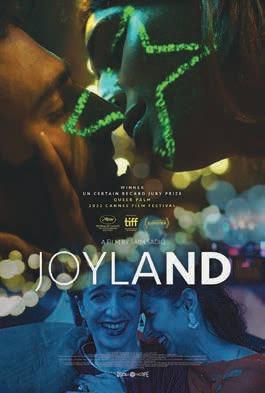

Sadiq and Khan spoke with me for the San Francisco Bay Times about their film.
deep tabooing of all things queer. None of these things were shameful to talk about anymore, even if they are still against them. But the first seed was sown. That was uncomfortable, but it was certainly necessary for any movement to really become mainstream. The initial part is always unpleasant, and we were at the center of that unpleasantness, but hopefully end up on right side of history.
Gary M. Kramer: Alina, Biba is often simultaneously desperate and determined. She wants to
“I’m going to shut the ‘f’ up and sit here and wait for this moment to be over because it’s too small for my anger to come out.” Those moments are more interesting and more relatable—even for straight people. I’ve lived in New York City for four years and I’ve seen this in how men talk to women. It is not only in Pakistan. No place is free from patriarchy.
Gary M. Kramer: Alina, why do you think Haider is attracted to Biba? And how does Biba process his interest in her?
Alina Khan: It starts out from their working together, but deep down she likes Haider because so many men

at its climax deciding who done it! The Menu is well worth seeing, too, though you might never eat s’mores again.
Jan Wahl
My darling Liam Mayclem and I are practically orgasmic when we discuss our favorite movies costarring food. It’s a topic as unending as great film itself. The most recent seems to be the weird and partially wonderful The Menu
At first this movie reminded me of Agatha Christie’s Ten Little Indians, also known as And Then There Were None Then, as the humor developed, I thought of one of my all-time favorite comedies, Murder by Death Don’t miss this one, with Truman Capote

Big Night is one I always think of for its strong storytelling of two brothers who own a small Italian restaurant. They are told the great singer performer Louie Prima is coming to dinner. If you don’t know the great Prima, check him out on YouTube. In Big Night, the place goes insane with special dishes and frayed nerves. Stanley Tucci stars and steals the show. This foodie actor later gives us his gorgeous food tour of Italy (Searching

for Italy on CNN) as well as a fascinating autobiography on his lifelong obsession with food.
Like my fabulous colleagues David Landis and Liam, I love talking with chefs. Salvio Defuria has been a chef for years, over twenty years partnering with Robert DeNiro in Los Angeles. He just opened a delicious, extremely reasonable Italian steakhouse in Sausalito called Gallo Rosso. He chooses The Menu and Big Night as his favorites.
But there are so many great ones left! The lust and love for chocolate will never be better demonstrated than in the lovely, lyrical Chocolat. It’s also a chance to see Johnny Depp at his hottest. The importance of food and drink in our lives is beautifully rendered in Babette’s Feast. This one deservedly won the Oscar for Best Foreign Film. It tells the tale of a Cordon Bleu chef from France who ends up in the middle of Scandinavian nowhere. She eventually shows the people there the value and richness of a fine feast, one you’ll never forget.

Chefs are shown in films as tormented (Burnt, Chef, Ratatouille), or inspired (Julie and Julia). Families take center stage in Soul Food, What’s Cooking?, Eat Drink Man Woman, Like Water for Chocolate, and Tortilla Soup Documentaries abound with Jiro Dreams of Sushi and Somm,, a detailed account of becoming a sommelier. The Hundred-Foot Journey has us craving two cuisines: Indian and French. We simultaneously crave chicken tika marsala and croque madame! Ethnic differences abound in Garlic Is as Good as Ten Mothers and My Big Fat Greek Wedding
There are so many other delectable movies, but too many cooks spoil the broth. Find your own delicious magic!
Jan Wahl is a Hollywood historian, film critic on various broadcast outlets, and has her own YouTube channel series, “Jan Wahl Showbiz.” She has two Emmys and many awards for her longtime work on behalf of film buffs and the LGBTQ community. Contact her at www.janwahl.com




Pomegranate (fiction - hardbound) by Helen Elaine Lee

The new novel Pomegranate is perfect for fans of Jesmyn Ward and Yaa Gyasi. It is a complex portrayal of queer Black womanhood and marginalization in America: a story of loss, healing, redemption, and strength. With an utterly captivating and distinct writing style, Lee paints a humane and unflinching portrait of the devastating effects of incarceration and addiction, and of one woman’s determination to tell her story.
Red Queen (fiction/mystery - hardbound) by Juan GomezJurado

Introducing Antonia Scott— the most compelling and original detective since Lisbeth Salander—in the international bestselling thriller that has taken the world by storm. The story includes Jon Gutierrez, a gay police officer in Bilbao, who under the best of work circumstances is marginalized by his colleagues because of his sexuality, but now he is disgraced, suspended, and about to face criminal charges due to professional poor judgement. He is offered a chance to salvage his career by a secretive organization that works in the shadows to direct criminal investigations. All he has to do is succeed where many others have failed while investigating a new, terrifying case.
I Thought You Loved Me (graphic novel - paperback) by MariNaomi

This graphic Gen X memoir, which is told in prose, collage, and sequential art, explores queer culture, feminism, race, class, sex work, and the flawed nature of memory. Jodie was Mari’s best friend through their teens and twenties. As young Mari began to explore her identity as a bisexual, biracial outsider in a rich, white town, Jodie was her constant confidant,

even kissing Mari out of the closet. The two were inseparable as they sought to gain a foothold in life and love as young feminists—Jodie an entrepreneurial sex worker, and Mari working in the boys’ club of video game development in the late ‘90s. Then, suddenly and mysteriously, Jodie ends their friendship. Years later, Mari is stunned when she discovers why.
Saturday, May 20 @ 11 am (free - Corte Madera store) Nina Schuyler with Jasmin Darznik, Afterword


A pioneer of artificial intelligence rebuilds the love of her life, but when she discovers he’s been feeding incriminating civilian information to the Chinese government, she’ll have to decide whether to keep or kill him. Afterword explores what it means to be human and is a moving testament to the deeply human desire for belonging, companionship, and love.
Saturday, May 20 @ 3 pm (free - SF Ferry Building) Neil King, Jr., author of American Ramble

This is a stunning, revelatory memoir about a 330-mile walk from Washington, D.C., to New York City—an unforgettable pilgrimage to the heart of America across some of our oldest common ground. Neil King, Jr.’s desire to undertake this walk began as a whim and soon became an obsession. By the spring of 2021, events had intervened that gave his desire greater urgency. By turns amusing, inspiring, and sublime, American Ramble offers an exquisite account of personal and national renewal—an indelible study of our country as we’ve never seen it before.
Saturday, May 20 @ 4 pm (free - Corte Madera store) Debbie S. Miller, author of Glaciers Are Alive

This environmental picture book introduces young science and nature lovers to the wonders of glaciers, the wildlife that call them home, and how important they are to the health of our planet.
A glacier may look forbidding and empty, but it supports abundant life. Follow a glacier as it flows from mountain to ocean, providing a home for ice worms, birds, bears, and more. Where the glacier meets the sea, it creates a rich environment for marine life such as seals, otters, and whales.
https://www.bookpassage.com/


Plant Magick by Jessica Hundley
Plant-loving witchy types, rejoice! The Library of Esoterica— which previously published beautiful books on astrology, tarot, etc.—has turned its attention to the green world all around us. Learn plant-lore, both ancient and modern!
The Priory of the Orange Tree by Samantha Shannon

Can you judge a book by its cover? In this case, yes! Samantha Shannon lays out a zesty, glittering mosaic of queer high fantasy.
The Deviants War by Eric Cervini
This lively and meticulously researched story of pre-Stonewall queer activism recounts the story of Frank Kameny’s battle with the federal government and its homophobic employment policies.
https://www.fabulosabooks.com/
Author, speaker, wine consultant, and television host Leslie Sbrocco is known for her entertaining approach to wine and food. She has won multiple Emmy Awards for her work on PBS, which includes hosting the series “Check, Please! Bay Area,” “Check, Please! You Gotta Try This!” and “100 Days, Drinks, Dishes & Destinations.”

www.LeslieSbrocco.com

Leslie Sbrocco
Famed basketball star, Dwyane Wade, partners with celebrated Napa vintner, Jayson Pahlmeyer, and together the two create game-winning wines.


The notable names may be familiar to sports and wine fans, but this isn’t some “celebrity” brand made just for headlines. On the contrary. Wade Cellars crafts both highly collectable and high-quality, affordable wines to enjoy daily. The “Three by Wade” Cabernet is lush, yet vibrant, and comes in a beautifully designed bottle that makes a statement.
Grab a glass, watch a game, and enjoy.
The popular Castro Farmers’ Market returned on Wednesday, April 5, with the opening of a new season. Managed by the Pacific Coast Farmers’ Market Association, the Castro Farmers’ Market is located on Noe Street between Market and Beaver.


An assortment of regular vendors offer a variety of products, including fruits, vegetables, nuts, pastries, seafood, meats, and prepared foods. The weekly event, held each Wednesday from April though mid-November, is a favorite gathering point for local residents and others from outside the neighborhood. The market’s manager, Mia Simmans, and her team have become familiar faces and community supporters during their years of continuing service.

David
LandisIt’s a nonstop 4 and 1/2 hour flight, but Mexico City is a world away from San Francisco. At more than 7,300 feet, the high-altitude metropolis of 22 million seems like it would be a teaming surge of humanity. But, surprise: it’s not. This sophisticated city charms with neighborhoods of green gardens and purple jacaranda trees lining the streets, alongside cafés on every corner. A walkable city in the neighborhoods where tourists visit, this burg has it all: temples from yesteryear, world-class museums, a temperate climate, and most of all, great food.
Of late, Mexico City (CDMX) has become a destination for global chefs who want to spread their innovative wings. So, it made sense for The Gay Gourmet to visit recently. Here’s my list of “mustdo’s” in Mexico City.
Restaurants

Contramar: At the top of any list of must-visit CDMX restaurants is the always-buzzing, upscale Contramar in the Roma district.

Run by celebrity chef Gabriela Camara (who used to run the popular Cala restaurant in San Francisco), this is a place to see and be seen. It’s only open for comida. That loosely translates to lunch, although comida is often the main meal of the day, eaten at 2 pm. The focus here is the always-fresh seafood and the menu item to order is the whole red snapper fish, cooked half with green parsley sauce and half with red chili sauce. The service is always first-rate, if not overly efficient—but being packed the whole time, the waitstaff has to



constantly move quickly. The menu is complemented by a well-curated wine list with both Mexican and international choices.
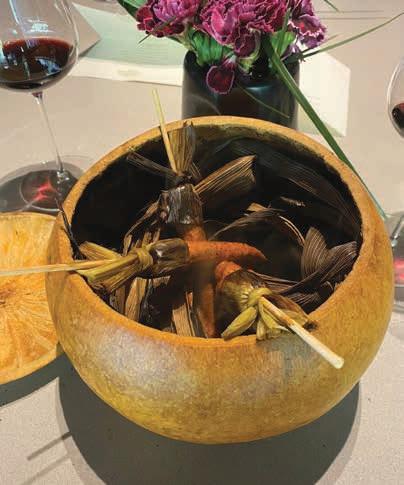
El Cardenal: This is a restaurant in the heart of the city (sporting several locations). With a longstanding history, El Cardenal has food that rings true as authentic Mexican fare. While it’s known for its breakfasts, we went for lunch on the terrace. That said, the popular third floor is where the action is. To start, the server brings you a small bowl of green sauce with cheese, cilantro, and avocado to make your own small
tacos. Our next course included a delicious soup I’ve never encountered before: a green tomato soup with purslane, onion, and diced chicken breast; simply sublime. For my entrée, I had the most creative Mexican cheese topped in squash blossom flowers. It looked like it belonged in a garden—or a museum. It tasted just as yummy. A Casa Madero chardonnay from Mexico was a light, crisp addition to the meal.
Maximo: This newly-relocated restaurant in Roma has a modern, California vibe, boasting “sustainable cuisine with the products at hand.” Chef Eduardo “Lalo” Garcia is one of the rockstars on the CDMX dining scene and his establishment has been voted into six editions of Latin America’s 50 Best Restaurants. Some of the standout dishes include: soft shell crab
tostadas with green macha sauce; a delectable chicken liver mousse; pea, fava bean, and mint soup; parmesan and mushroom risotto; and a perfect Wagyu flat iron beef steak.
Pujol: Always in the top ten of restaurants worldwide, Pujol in highend Polanco is chef Enrique Olvera’s temple to Japanese-inspired Mexican fine dining at an elevation unlike any other. Go for lunch, as we did, and you can enjoy the views of the manicured Zen-like garden, while savoring the conviviality inside. Get ready for a culinary ride of imagination, starting with a scallop margarita, an octopus empanada, bluefin tuna with shellfish chilpachole, mushroom mixiote with mole amarillito, and a tamarind nicoatole with guava ice cream. All are presented with aplomb in creative and unexpected presentations. The service is superlative and the wine list surprising and extensive. Overall, this was one of the best meals of my life.
Bars
Hanky Panky: It’s quirky, hard to reserve, and even harder to find (in the Juarez district)—but well worth the effort. You enter through a
working taco stand (yup, we passed by the entrance 3 times before finding it), then enter through a back door in the kitchen to an intimate, dim, 1920s-style speakeasy. Red leather booths line one side of the retro-chic bar, directly opposite from stools facing the always-busy mixologists. We were lucky enough to sit in the private sunken cubbyhole, accented by a glamorous chandelier. Hanky Panky boasts drinks from around the world and creative new concoctions, but, of course, I opted for a classic Negroni, executed to a T. The bar’s name comes from the Fernet, gin, and sweet vermouth cocktail invented in the early 1900s
Hotel. Best part of the experience? You exit through the refrigerator door!
GinGin: With two locations, one in Roma and the other in Polanco, this homage to the juniper-based liquor is all the rage. Sitting outdoors on the terrace on a warm night in CDMX allows you to enjoy the passersby (and their dogs), while sipping terrific cocktails. A diverse variety of gins spur the botanical libations that dominate the menu, including: Velloncino de Oro (a rosemaryinfused gin cocktail), a Mexican Pimm’s, and, of course, a classic martini.
For the uninitiated, don’t miss Teotihuacán, the extensive pyramids about an hour from the city constructed between the 1st and the 7th century. It’s unknown who built them, but they feature signs of various cultures, including Maya, Mixtec, and Zapotec. Also, Mexico City is host to some of the great museums of the world. Make sure to visit the famous National Museum of Anthropology, which, according to Wikipedia, “contains significant archaeological and anthropological artifacts from Mexico’s preColumbian heritage, such as the Stone of the Sun (or the Aztec calendar stone), and the Aztec Xochipilli statue.”
Another must is the Frida Kahlo Museum (book early!), in the Colonia del Carmen neighborhood. Also known as the Blue House for the structure’s cobaltblue walls, the structure is a historic house and art museum dedicated to the life and work of Mexican artist Frida Kahlo. Another great activity is a tour of the Palacio de Bellas Artes near the Zocalo (main square) of CDMX, with its numerous murals, including those of Diego Rivera.

The St. Regis Mexico City in Cuauhtémoc is a luxurious, upscale offering in a great location with numerous fine restaurants. Another recommended option for the business-oriented traveler is the Hyatt Regency in Polanco, with stunning views. I wouldn’t recommend XOMA, the boutique apartments by Viadora. We had a bad experience there and suspect the establishment might be antiLGBTQ+.
All in all, put Mexico City on your destination map: it’s safe, beautiful, a lot of fun, and best of all, you’ll eat and drink well.



Bits and Bites
Inspired by Beatrice Wood, (the “Mama of Dada”), Beato Chocolates are a female-owned, self-proclaimed “anti-established” chocolate maker based in Ojai, California. Besides that, they make some tasty chocolate bars, including: the “Dance of the 89 Positions ruby chocolate,” (a “pink” chocolate); the “Titanic” (dark chocolate, rose, and sea salt); “Bed
Stories” (dark chocolate with raspberries); and my favorite, “Menage a Trois” (dark chocolate, toffee, and sea salt). They don’t skimp; the dark chocolate is all 72%.

These bars are both artsy and delicious!
Contramar: https://tinyurl.com/3u8vb8c8
El Cardenal: https://tinyurl.com/dpna9fjv
Maximo: https://tinyurl.com/yyusey2b
Pujol: https://tinyurl.com/2muxkypr
Hanky Panky: https://tinyurl.com/bd82t24e
GinGin: https://tinyurl.com/5havavaz
Teotihuacán: https://tinyurl.com/2x7b3yx2
National Museum of Anthropology: https://tinyurl.com/d4t6bzfc
Frida Kahlo Museum: https://tinyurl.com/k6x3w3u5
Palacio de Bellas Artes: https://tinyurl.com/yc6wm5wd
St. Regis Mexico City: https://tinyurl.com/yuva52pj
Hyatt Regency Mexico City: https://tinyurl.com/4bmdwzum
Beato Chocolates: https://tinyurl.com/25ns7ez4
David Landis, aka “The Gay Gourmet,” is a foodie, a freelance writer, and a retired PR maven. Follow him on Instagram @ GayGourmetSF or email him at: davidlandissf@gmail.com Or visit him online at: www.gaygourmetsf.com
“I was at a point in my life where I didn’t know if the road to recovery was worth it. I just didn’t know if I wanted to continue my life like that. I was severely damaged. I had little to believe that as a gay man I had any worth and deserved to be loved.”
Joe Caldiero sat across from me using mostly his hands to speak his emotions. His eyes conjured now vivid and oftentimes painful memories. And his scruffy voice softened and trembled as he narrated the deep scars of his past. Caldiero’s story isn’t necessarily unique. His story, however, resonates the collective voices, hardships, struggles, and emotional turmoil of the LGBTQ+ community.
Caldiero recollected his childhood years: “I was a ‘military brat,’ and my dad taught me to work as hard as I can in whatever I choose to do. I also played a ton of baseball because my dad was a minor leaguer and had high hopes that I could take the next step and play in the majors. My dad and I were really close, but I really hurt him when I quit baseball because we had an argument. For years, that’s all I could remember from my days growing up on the military bases.”
Caldiero continued, “I joined the Air Force as a means to make amends with my dad for quitting baseball and was awarded the highest honor as one of the 12 Outstanding Airmen of the Year. I even got married and had two kids, but the marriage only lasted four years mainly because we fought. Career-wise, I was on the fast track to be an accomplished Airman with an unlimited future in the Air Force.”
“But my personal life was the contrary,” Caldiero added, gathering his thoughts. He sighed deeply and proceeded: “After the divorce, I started remembering things in bits and pieces from my early teens that I apparently blocked out for many, many years. The memory that triggered a slew of damaging narrative was I had a best friend named Shane who was my world, but I didn’t know what it meant. One night, on one of our
many sleepovers, his father caught us cuddling. That was the last I’ve seen him. Next day, he didn’t come to class. He didn’t show up to our varsity basketball team practice. His father had transferred him away from me.”
After a brief moment of silence, Caldiero explained, “You know, your mind is an interesting thing. I just blocked out that Shane ever existed. Maybe my mind was trying to protect me from the hurt. Or maybe my mind didn’t allow me to be gay because I was told many times being gay was wrong. I don’t know ... . But I started to remember things bit by bit, piece by piece.”
In the Air Force, Caldiero’s work ethics rewarded him with achievementbased promotions that few could attain. However, “Don’t Ask, Don’t Tell” spread paranoia among the millions who served in the military. One suspicion could end years of dedication, sacrifice, commitment, and, most importantly, honor. Although paralyzed with fear, the intense desire to find love and happiness gave Caldiero the motivation to cautiously and anonymously explore his sexuality.
Caldiero lamented, “No matter how careful I was, suspicions grew. I had no choice but to make a life-defining choice. Be myself and renounce everything I worked so hard to achieve or sign a legally binding document denouncing any feelings and urges I have as a basic human being. I chose the former because I couldn’t deny my true self. I’ve lost too many years already. And it came at a hefty price. Being gay meant I lose everything: respect from my peers, my career, my self-worth, and my family. I learned that I will never be good enough and I don’t deserve love. And the saddest reality, my existence was wrong. I gave up custody of my daughter because I thought I would turn her gay and I desperately didn’t want her to live a ‘wrong’ life too.”
Although struggling mightily with his same sex attraction, Caldiero remained strong on the professional front and found great success in a new career path, hospitality, because of his work ethics. His new industry enabled Caldiero to meet LGBTQ+ people openly and introduced him to gay softball.

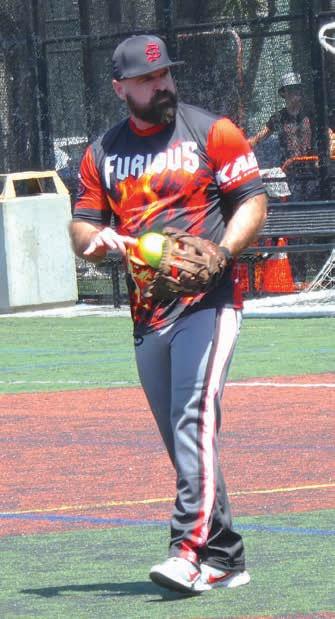
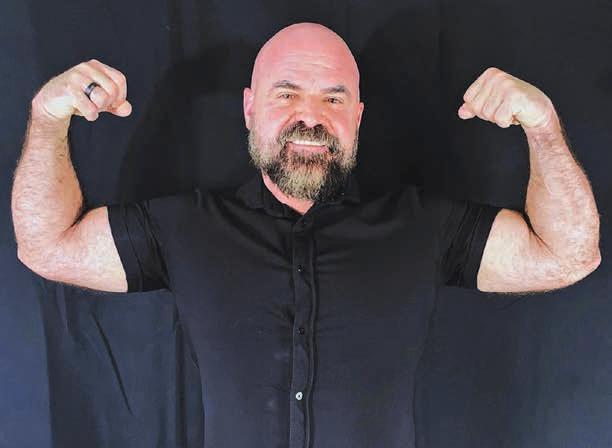

Caldiero lit up when talking about playing gay softball. “I quit sports altogether
because I thought gay men don’t play sports,” he said. “Gay softball showed me [differently] and provided me with a safe space where we don’t have to masquerade or hide. I felt a strong sense of brother and sisterhood, a bond much like a family. I have a family again. [Gay] softball Sundays also gave me a mental reprieve from years of psychological and emotional damage. Another significant gay softball revelation was I got to see gay men and women unafraid to express themselves, especially physically, and be whoever they want to be and love whomever they want to love. And I very much wanted that expressive freedom.”
“So, when an adult film company approached me, I said yes because I wanted to exorcize my own mental suppression and prove my own acceptance of being gay,” he shared. “In the beginning, the attention, the glamour, the compliments, and the
love were intoxicating. Then they weren’t enough. For every short-lived shallow admiration, I must further improve my physical appearance just to keep the ‘love’ coming.” Over time, Caldiero desperately needed more and more praise to replenish an insatiable destitution. “It was a vicious and endless cycle and I thought less and less of myself.”
To an outsider, Caldiero had it all: fame, success, popularity, and countless admirers. But deep down inside, Caldiero felt little self-worth and a sense of helplessness. “I thought I was damaged beyond repair,” he said. “I pushed whoever tried to love me away because how could anyone want to love me? Why do I deserve to be loved?”
“But every day I looked forward to softball Sunday,” he added. “I couldn’t wait to play, to see my family, and to let out some pent-up despair. The last time I spoke to my dad, he told me that he loved me and was
proud of me. His approval meant everything. The next day, he suffered a fatal heart attack. His death broke me. I went to softball that Sunday and pitched the game of my life. I did it for him and for me. At that point in my life, I needed gay softball more than ever.”
He concluded: “Through my most challenging narratives, softball gave me something to look forward to so that I wouldn’t give in, or worse yet, give up. Softball kept me alive so that I could meet the love of my life, who patiently and unconditionally taught me and showed me that I can love and receive real love. Softball bought me time to understand that I may be broken, but time can help heal the irreconcilable. And gay softball kept me afloat so that I can finally recognize I have worth, I am not wrong, and I will be alright.”
John Chen, a UCLA alumnus and an avid sports fan, has competed as well as coached tennis, volleyball, softball, and football teams.


SFAC Main Gallery, War Memorial Veterans Building, 401 Van Ness Avenue, Suite 126. Public reception May 19, 6–8 pm. Free and open to all.
 By Sister Dana Van Iquity
By Sister Dana Van Iquity
Sister Dana sez, “HARVEY MILK DAY is on May 22. Let us honor the amazing activist who helped break down so many closet doors!”
HARVEY MILK DAY is organized by the HARVEY MILK FOUNDATION and celebrated each year on May 22 in memory of Milk, a gay rights activist who was assassinated in 1978. Milk was a prominent gay activist during the 20th century. He ran for office three times before becoming the first openly gay person elected to California public office, where he served as a San Francisco City Supervisor.
“Harvey Milk Day” came about as a day to remember and teach about Milk’s life and his work to stop discrimination against the LGBTQ community.
In observance of Harvey Milk Day, the Castro Theatre will have a FREE showing of The Times of Harvey Milk and a film about the founder of PROJECT OPEN HAND: The Ruth Brinker Story. Doors open 12 pm with the Milk film at 1:15 pm and the Brinker one at 2:45 pm.
COUNTERPULSE is a dynamic movement of experimental art that sparks personal transformation and builds enduring community. They provide space and resources for emerging artists and cultural innovators, serving as an incubator for the creation of socially relevant, community-based art and culture.

CounterPulse acts as a catalyst for art and action; creating a forum for the open exchange of art and ideas, sparking transformation in our communities and our society.
CounterPulse had a fabulous fundraiser, INNERSPACE: UNDERCURRENTS, on May 6 at their 80 Turk Street venue. We enjoyed gorgeous performances by RUPTURE, Big Purpose, Snaxx, Phoebe Cakes, and ARC combustible artists Driven Arts Collective. We danced together with DJs Nihar and Stanley Frank Sensation and celebrated this lovely community of ours. It was also the perfect opportunity to shamelessly promote we Sisters of Perpetual Indulgence’s upcoming PROJECT NUNWAY, which you will read about in this column and hopefully attend.
THE SAN FRANCISCO ARTS COMMISSION (SFAC) Main Gallery is excited to present INVINCIBLE BLACK SOUL: The Art of Bearing Witness, a threeperson exhibition featuring the works of Mark Harris, Raymond L. Haywood, and Bryan Keith Thomas. The exhibition explores the work and legacy of influential novelist, playwright, activist, gay man, and public intellectual, James Baldwin. This exhibit explores Baldwin’s ideas and examines how artists across different media continue to use art as a tool to bear witness to the times. Curated by artist Mark Harris, the exhibition looks at these themes through the lens of three Black Bay Area artists. The works by Harris, Haywood, and Thomas create a diverse range of responses to Baldwin’s life and writings—from a direct reference to his work to more general reflections on what it means to bear witness to their surroundings.
Sister Dana sez, “Congratulations to RUPAUL’S DRAG RACE ALL STARS for winning the MTV Movie and TV Awards’ Best Competition Series. This is so important during these terrible, horrible, blatantly bigoted anti-drag legislations!”
Fashion meets philanthropy at the 11th annual PROJECT NUNWAY, the iconic fashion event that raises awareness and funds for local organizations. Presented in partnership with Saint Joseph’s Art Society, this year’s theme, “Sanctuary,” features unique runway looks created from recycled and repurposed materials. “Sanctuary is a powerful theme that speaks to the heart of our community,” says Sister Hera Sees Candy. “We want to use the art of fashion to create a space where everyone can feel safe, celebrated, and empowered.” Sister Dana is thrilled to be one of the nun models werkin’ it! Get your tickets for this fun fashion and full-on entertainment extravaganza on May 26, 7 pm, 1401 Howard Street.
https://tinyurl.com/SPI-PN11
THEATRE RHINOCEROS & YERBA BUENA GARDENS
FESTIVAL presents PERICLES by William Shakespeare, conceived and directed by John Fisher To those who have seen and loved Theatre
Rhinoceros’ queer outdoor Shakespeare revels of years past, which have included high-drama tragedies like King Lear, Titus Andronicus, and Macbeth, Pericles might seem like a wildcard. Historians often group Pericles, Prince of Tyre with The Tempest and The Winter’s Tale, Shakespeare’s later romances; indeed, they share a tragicomic, darker tone and fantasylike structure, which oddly makes Pericles the perfect selection to showcase Rhino’s talented ensemble against the unique and beautiful architecture of Yerba Buena Gardens and its surrounding structures. Set outside in the gorgeous Gardens, it runs May 26–27.
https://www.therhino.org/
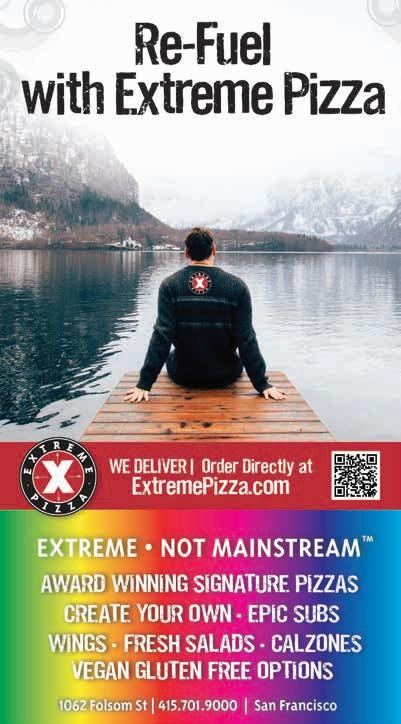
HEELS FOR HOPE is a Variety Show Fundraiser for MAITRI. This party features incredible local talent and fabulous drag queens with proceeds benefiting Maitri Compassionate Care and their services for low-income people living with


HIV/AIDS or recovering from gender-affirming surgeries. They have some incredible artists joining them this year: hilarious comedian and lesbian icon Sydney Stigerts; the most up-and-coming funk & soul vocalist in the Bay, Tory Teasley; OutMusic Award winner and Billboard Recording Artist Brian Kent; and high camp drag from FOU FOU HA! Marines’ Memorial Theatre, 609 Sutter, June 3, 5 pm for VIP reception and show at 7 pm.
https://tinyurl.com/msm3ppsu
Mark your calendar, prepare your best and brightest, and kick off PRIDE AT GRACE CATHEDRAL on June 4, 6–7:30 pm. This year’s event is all about celebrating community, as we gather and celebrate with our friends and neighbors. The celebration begins with LGBTQ organizations from across the bay in a joyful procession up the cathedral’s rainbow steps. PRIDE MASS is presented by Grace’s extremely inclusive, gay-loving offshoot, THE VINE, which meets every Wednesday night at 6:30 pm in the cathedral. For “Pride Mass,” we are delighted to welcome special guest preacher Marvin K. White—writer, artist, public theologian, and Minister of Celebration at GLIDE, with Grace Cathedral’s own Rev. Canon Mary Carter Greene, presiding. Music will be provided by the renowned GLIDE ensemble. There will be a rainbow cake, confetti, and champagne. You don’t have to be religious to enjoy Grace!
SF SNARKFEST: A Trans BIPOC Comedy Festival is a two-night comedy carnival featuring 9 trans BIPOC (Black, Indigenous, and People of Color) comedians, which will be screened on YouTube on June 6 and 7. Filmed in April in front of a small audience of 50 in San Francisco, the festival is the first of its kind. Five comedians ranging in ages from 20s to 60s will perform each night including Nori Reed, who created Disney’s first-ever live action trans character, Nikki, on the show Raven’s Home, and Ms. Billie Cooper, a black transgender activist and former San Francisco Board of Supervisors candidate. The need to hear trans voices is greater now than ever under the current political climate, with GOP scapegoating of trans people and attempted passage of laws targeting trans youth throughout the country.
https://www.peacockrebellion.org/ LGBTQ SENIOR PROM is back!
(continued on page 12)
Grand Duchesses XLI Joie De Vivre: The Cajun Showgirl on Steroids
Colors: gold and purple
Symbol: Mardi Gras mask
Always saying: “We rise from the ashes.”
Coronation Theme: “The Night of The Rising Phoenix Over Korsakov”
When a candidate campaigns to become a Grand Duke or Grand Duchess, there is always a representation of colors that allows voters to know whom they are voting for. In most cases, candidates will also have a “catchphrase” and a coronation theme for their step-down.
We have taken a look at the last 40 Royal Houses and have gotten to know a little about each of them. Now, I will feature the remaining 9 Royal Houses, one at a time and each leading us to the current Reigning Monarchs and to the candidates of The Grand Ducal Council’s 50th Reign. Here is a spotlight on the 41th Royal House:
2013–2014
The 41st Royal House of The Rising Phoenix Court of Champagne, Chocolate, and Jambalaya



Grand Duke XL Kippy Marks: The Bubbly Champagne and Chocolate
Grand Duke
Colors: gold, green, and purple
Symbol: music staff and notes
Always saying: “The Kingdom must be run.”
This Royal House made Ducal History on several levels. It was my year, and it was filled with ups and downs, twists and turns, laughter and tears, destruction and Resurrection.
The first in this Ducal history-making reign was that I was the first ever elected Black Grand Duke within the organization’s 41-year history. The second is that I had two Realms/ Kingdoms, and the third is that I had two Grand Duchesses!
As I mentioned in the last issue of the San Francisco Bay Times, Grand Duchess XXXVIII Kylie Minono inspired me so much that I begged and pleaded and beseeched her to become my campaign manager. I was very lucky and blessed that she agreed and I knew at that moment I was going to win, and I did.
There was only one candidate running for Grand Duchess (Pat-N-Leather) and one other Grand Duke candidate (David C. Herrera). Pat-NLeather would become the duly elected Grand Duchess and

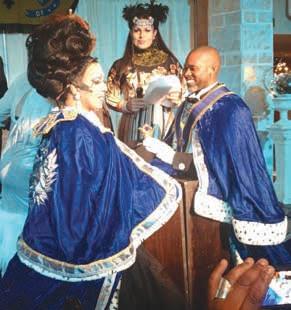
David C. Herrera would become my Royal Crowned Prince, (RCP). Our first Realm/Kingdom was known as “The Court of Champagne, Chocolate, and Realberries.”
This court consisted of my Crown Prince (CP): Aja Monet Ashton
Royal Crown Princess: Sr. Eve Volution
Crowned Princess: Lexi Shimmers
Pat and I would rule the Realm/ Kingdom for six months before it completely collapsed, leaving devastation and destruction in its path. Needless to say, there was scandal and strife and, in the end, the duly elected Grand Duchess resigned from her position and took her RCP and the Realm/Kingdom with her. Having experienced this, I found myself in utter shock. I was hurt and confused as to how to proceed, but The Grand Ducal Council of San Francisco stepped in and followed the protocol written in the bylaws and placed a Regent Monarch as my New Grand Duchess.
Enter Joie de Vive. Together we resurrected the Realm/Kingdom to its glory. Our new Realm/Kingdom was known as: “The Rising Phoenix Court of Champagne, Chocolate, and Jambalaya” and we also created a new Royal Crest.
My newly appointed Regent Grand Duchess Joie de Vivre appointed Virgil Roma as her Royal Crown Princess (RCP) and for the last 6 months of our Realm/Kingdom we reigned together, flourishing and shining brightly with dignity, respect, and the Mardi Gras flair of joy and celebration. I am forever grateful to Joie de Vivre for accepting the position and choosing to reign together with me as her Grand Duke the last six months. I truly love and appreciate you, Joie de Vivre!
I asked Joie de Vivre to share her personal thoughts about her experience reigning with me and serving in the Grand Ducal Council. She shared:
“While I’d known I was ‘different’ for decades, growing up in the ‘70s, I wasn’t aware of any trans people, and it took me years to put a name to my desire to live life as a woman. [This was] partly due to the stereotypes, both within the trans community and outside of it—that you had to hate your male body and hate living as a man to be ‘truly trans’ and transition. While I wasn’t enthusiastic about either, it wasn’t suicide or die for me. But I know I loved being a woman, even if I thought it was impossible to do so. However, eventually the urge became too much, and I started going out in public as a woman. I ran into the Ducal Court, and I hit the trifecta: it was a place where I could perform; I could do volunteer work; and most importantly, it was a place where I could explore my gender identity and expression in a supportive environment.”
“By the time I reigned with Kippy Marks in 2014, it had become clear

that I wasn’t as gender fluid as I’d thought I’d been, and the thoughts of transitioning started forming, but it was something I was wrestling with,” she continued. “At the time, transitioning was much more daunting than it is today, and I feared losing my job, my family, and my friends. While I was out within the Court, I wasn’t out in the rest of my life, and I’d seen other transitions go badly. But knowing the Court would be there for me regardless was one of the things that gave me courage to start seriously thinking about living life as a woman.”
She added, “Likewise, reigning with Kippy caused me to stretch myself to do things I hadn’t known I was capable of, which showed me that I’d have the strength to transition, which was the most intense and stressful thing I’d ever done in my life. If it hadn’t been for my experiences with the Court, I may well have continued to live a life of quiet desperation as a man, but thankfully, after my reign I started living as a woman everywhere outside of work, and then fully came out and fully transitioned a year later.”
On September 22, 2023, the Grand Ducal Council of San Francisco will celebrate 50 years of Camp and Fundraising. The celebration will take place at the Academy of Sciences in San Francisco. Please consider becoming a sponsor.

Inquiries:
50thanniversary@sfducal.org
Tickets ($60) are on sale through August 25, 2023, with a hard stop on that final date. We hope to see you at this once-in-a-lifetime historic event!
https://www.sfducal.org/
SISTER DANA (continued from pg 10)

No dress code, and no dates required—OPENHOUSE welcomes wallflowers, dancing queens, and everything in between. They will provide a DJ, light appetizers, prizes for prom royalty, and an amazing time; you just bring yourself! June 8, 3–6 pm at 75 Laguna. RSVP at 415231-5871 or rsvp@openhousesf.org


According to data collected by researchers from USC, UCLA, UC Merced, and Oregon State University, daily use of hate speech by those who previously posted hateful tweets nearly doubled after Musk finalized the Twitter sale. And the overall volume of hate speech also doubled site-wide. Sister Dana sez, “One billionaire owner yields twice the hate.
Musk must be muzzled!”
According to GUN VIOLENCE ARCHIVE, there have been 667 mass shootings since the awful, racist Buffalo massacre on May 14, 2022. Meanwhile, five and a half months after the deadly Club Q shooting in Colorado Springs, many thanks go to openly gay Colorado Governor Jared Polis (D), who has signed four new gun control bills into law—and, of course, a gun rights group is already suing. The laws raise the minimum age to buy a gun from 18 to 21 (though there are exceptions); establish a three-day waiting period before a gun can be delivered after purchase, and a background check; remove liability protections to make it easier for
gun violence victims to sue manufacturers for defective products; and expand the state’s red flag law.
President Joe Biden wrote in a May 14 op ed: “The majority of Americans—even the majority of gun owners—want Congress to take some common sense action to reduce gun violence. But too many Congressional Republicans are doing the bidding of gun manufacturers instead of their constituents.”
Sister Dana sez, “Congress must reinstate the Assault Weapons Ban! It worked in the past and can work again. Most Americans agree: Civilians do not need military-grade weaponry!”

The LEATHER & LGBTQ Cultural District’s fifth anniversary party, Audacious Anniversary 5, took place at the Folsom Street Foundry on May 6. Emcees Alotta Boutté and Lance Holman welcomed guests and introduced performances by Ryan Patrick Welsh, the ambient suspension bondage of Twisted Windows, John Weber accompanied by Kippy Marks, the OmNomNom X Palace of Trash, and Boutté. DJ Fawks provided music throughout the evening, during which guests were asked to “strut your smut—aka your hottest fetish gear—in the second annual Brazen Runway.”

State Senator Scott Wiener and SF Supervisor Matt Dorsey presented proclamations that were received by the district’s Bob Brown on behalf of the organization.


The PRC Bare Chest Calendar Leather Men also attended. Tasty treats were provided by MamaBear’s Kitchen, and there were demos by the Exiles, Service Pups of San Francisco, ELSE, and ONYX Northwest. Others who helped out with the event included David Heyman, Kelly Hunt, Joe Pessa, Cal Callahan, Gayle Rubin, and more. https://sfleatherdistrict.org/

Photos by Rink
Since 1983 the AIDS Legal Resource Panel (ALRP) has provided assistance to LGBTQ+ community members. To celebrate its four decades of services, a reception and program was held on Thursday, May 11, at Fable restaurant on Castro Street.
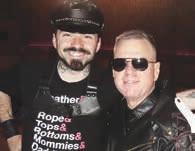
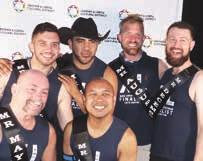







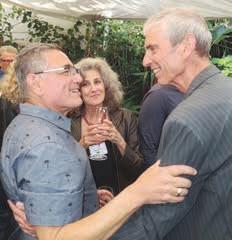

ALRP Executive Director Bill Hirsh welcomed guests and presented awards to the honorees. Dr. Murtuza Ghadiali accepted the Community Partner Award on behalf of Bay Area Physicians for Human Rights (BAPHR). Amy Eskin and Mitchell Shapson were honored with the James C. Hormel Philanthropy Award in honor of their longstanding support.
Supervisor Rafael Mandelman presented Certificates of Honor and spoke on behalf of District 8, which he represents.
https://www.alrp.org/










Honoring the late Emperor 32 Fernando Robles and hosted by Emperor 42 A. N. John Paul Soto, the 21st Annual Cinco de Meow party was held on Saturday, May 6, at Beaux SF located in the Castro. Emcees for the evening were Emperor 28 John Carrillo and Absolute Empress 33 Alexis Miranda. Net Proceeds and 90% of gross raffle ticket sales benefited the Imperial Council of San Francisco 60th Anniversary and the Monarchs Charity Fund. Reigning monarchs Emperor Michael Chua and Empress Cameron Stiehl-Munro attended and helped welcome guests. https://internationalcourtsystem.org/



Ladybug House
Create a safe haven for beneficial and adorable beetles with Kikkerland’s Ladybug House. Hang it in a sheltered spot near any plants that need protection from aphids and skip the pesticides! $11.99

California Color
Rewild any sunny patch with California native wildflowers from Botanical Interests. Each packet contains more than 5000 seeds, including favorites like sunny golden poppies, elegant Clarkia, and cheery baby blue eyes. $6.29 per packet

https://cliffsvariety.com/

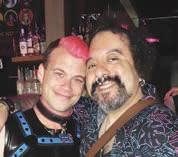
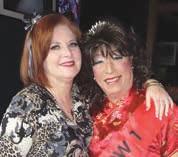





Since our founding in 1936, Cliff’s Variety has been constantly growing and evolving in response to the needs of our customers. Our buyers strive to keep our selection fresh, on-trend, and competitive. We carry the best of everything from hardware & tools to cookware, garden supplies, toys, crafts, and gifts. We also offer re-keying and lock repair, knife sharpening, glass, acrylic & wood cutting. Light fabrication, pipe threading, and cable crimping are among the many other services we offer at Cliff’s Variety. If your project has gone a little beyond your abilities, we’re here to help.

